#Napoleon in the Mirror of History
Explore tagged Tumblr posts
Text
The concept of ‘legitimacy’ as a matter of sovereignty first enters English discourse as a response to Napoleon
Excerpt from British Radicals and 'Legitimacy': Napoleon in the Mirror of History by Stuart Semmel
———
The introduction of ‘legitimacy’ into British political discourse seems to have been directly connected to the peculiar case of Napoleon. His superficial similarity to a king, in the wake of France’s republican experiment, made it necessary to distinguish him from other monarchs by dwelling on the quality he lacked, that of hereditary descent from a line of kings. Perhaps the earliest appearance of the new usage came in 1801, when the True Briton newspaper contrasted the ‘obtrusive upstart’ Napoleon with France’s ‘legitimate Monarchs’. The adjective occurred frequently in discussions of Napoleon (an 1803 broad-side, for example, called on the French to remove Bonaparte from ‘his usurped station . . . and hail the return of their legitimate prince’). The ultra-loyalist journalist Lewis Goldsmith employed the word frequently — as when he bemoaned Napoleon’s placing members of his own ‘bastard family on the thrones of ancient legitimate monarchs’. Goldsmith, in accusing the entire Bonaparte clan of bastardy, was not claiming that every member had been born out of wedlock. The new meaning rather accused Napoleon and his siblings of having been born outside of dynasty. Even as we chart the emergence of the new usage, however, Goldsmith’s language should remind us that the older meaning lurked underneath the surface (as it perhaps still lurks). The double meaning was present in contemporaries’ minds, as occasional wordplay suggested — not least because it was a common loyalist tactic to question the purity of Napoleon’s mother, and thus Napoleon's paternity. . .
As far as its critics were concerned, the virtue now trumpeted by continental dynasts amounted to nothing less than the ‘old doctrine of Divine Right, new-vamped up’, as the radical journalist William Hazlitt put it. ‘Legitimacy’ seemed an anachronism to Hazlitt, a ‘mock-doctrine’ dug up by ‘resurrection-men’. Thomas Babington Macaulay, in a similar spirit, would write in 1825 of ‘the doctrine of Divine Right’ having ‘come back to us, like a thief from transportation, under the alias of Legitimacy’. To those who worried about the strength of the executive, the new term ‘legitimacy’ seemed a bare-faced admission of a plot, on the Stuart model, against British liberties. Necessity had often been invoked, during the French wars, to justify infringements on traditional freedoms. Many now shared Hazlitt’s foreboding, expressed as news of Napoleon’s 1814 fall reached Britain, that ‘The restoration of the Bourbons in France will be the re-establishment of the principles of the Stuarts in this country’.
#napoleon#napoleon bonaparte#napoleonic era#napoleonic#first french empire#19th century#french empire#france#history#sovereignty#legitimacy#Stuart Semmel#Semmel#quotes#British#British Radicals and 'Legitimacy': Napoleon in the Mirror of History#Napoleon in the Mirror of History#British Radicals#England#Hazlitt#William Hazlitt
18 notes
·
View notes
Text
Pick a Novel: Keywords/prominent themes in your life
Pick the novel that draws your attention the most. If you can't decide between two, then look at the 2 readings. This is a general reading, so not everything will apply. Please take what resonates and leave what doesn't behind!
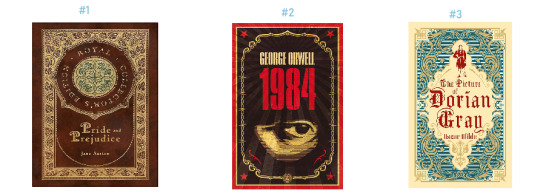
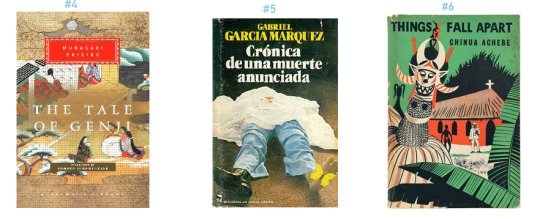
#1
Keywords: love, lust, passion, fun, temperament, cafe, sweet, bicycle, pen, books, music, loyalty, winter, sofa, furniture, thoughts, light, intuition, soulmate, art, obsidian, cake, carbonated water, skincare, socks, cooking
Celebrities/Public Figures: Audrey Hepburn, Min Yoongi, IU, Claude Monet, Angela Merkel, Andrew Carnegie, John Johnson, Mark Zuckerberg, Larry Page, Howard Schultz, Sam Walton, Amancio Ortega, Queen Elizabeth I, Jane Austen, Jennie Kim
Countries: Italy, Canada, South Africa, Thailand, Saudi Arabia, Singapore, Greece, Madagascar, Qatar, Sweden, Zambia, Taiwan, Solomon Islands
Numbers: 11, 1, 5, 9, 80, 888, 6
Brands: Hermes, Tiffany, Apple, Instagram, Taobao, Lamborghini, Deloitte, Microsoft, Chopard, Givenchy, Patek Phillipe, Chloe, Alaia, Kraft,
Kpop songs: Young Forever by BTS, Shine by PENTAGON, Me Gustas Tu by GFRIEND, Run to You by DJ DOC, Love Lee by AKMU, Deja vu by TXT, Back Down by P1Harmony, Love shot by EXO
#2
Keywords: economy, job loss, new opportunities, play, drama, anger, frustration, lost, compass, computers, battery, feet, head, brain, summer, pearl, avocado, junk food, fried chicken, challenge, frugal
Celebrities/Public Figures: Grace Kelly, Billie Eilish, Keanu Reeves, Rosé, Jung Hoseok, Salma Hayek, Pablo Picasso, Princess Diana, Thomas Edison, Sergey Brin, Mary I, William Shakespeare, Lee Nayeon
Countries: New Zealand, USA, Maldives, Indonesia, United Kingdom, Venezuela, Lithuania, Nepal, Portugal, Poland, Lebanon, Mali, Netherlands
Numbers: 4, 99, 101, 33, 13, 14, 0
Brands: Masion Margiela, Amazon, facebook, Shein, PWC, Missoni, Moschino Couture, Toyota, citi bank, Chaumet, Polene, Pizza Hut,
Kpop songs: Love Dive by IVE, Shangri-la by VIXX, Sweety by Clazziquai, I NEED U by BTS, The Chaser by Infinite, Magnetic by ILLIT, My House by 2PM, ICY by ITZY
#3
Keywords: tales, gossip, lies, funny, movies, theatre, cell phone, cool, kpop, magenta, ancient, history, claws, cats, tiger, fall, jealousy, games, aquamarine, lemons, makeup, pencil, groceries
Celebrities/Public Figures: Beyonce, Lady Gaga, Morgan Freeman, Kim Seokjin, Jang Wonyoung, Matt Damon, Napoleon Bonaparte, Shinzo Abe, Steve Jobs, Voltaire, Kim Jisoo,
Countries: Ethiopia, France, Russia, Ireland, Argentina, Afghanistan, Libya, Rwanda, Nigeria, Pakistan, Morocco, Malta, Kazakhstan, Kenya, Iraq,
Numbers: 2, 7, 69, 25, 55, 79, 1182
Brands: Saint Laurent, miumiu, Starbucks, Mercedez-Benz, Nestle, Oracle, Tod's, Bulgari, Rolex, KFC, SUBWAY, Carrefour, Kellog's
Kpop songs: Supernova by aespa, Maestro by seventeen, Not by the moon by GOT7, Alone by Sistar, Hip by MAMAMOO, Good Day by IU, Bite Me by ENHYPEN, Work by ATEEZ, The Feels by TWICE
#4
Keywords: foreign, spicy, peppery, rice, no, objection, resistance, control, storms, thunderstorms, shower, tension, crush, pop, paper, mango, legs, fragrance, emerald, clothing rack, tomatoes, defeat,
Celebrities/Public Figures: Judy Garland, Margot Robbie, G-Dragon, Jeon Jungkook, Pharrell Williams, Emmanuel Macron, Bill Clinton, King Charles, Warren Buffet, Cleopatra, Kim Mingyu
Countries: South Korea, Philippines, Scotland, Spain, Albania, Guatemala, Malaysia, Iran, Romania, Honduras, Georgia, Croatia, Belgium, Czech Republic, Gambia, Guinea
Numbers: 31, 75, 412, 43, 486, 640
Brands: Chanel, Prada, Bentley, Gucci, Samsung, Disney, BMW, Hyundai, cisco, Van Cleefs & Arpels, Dior, Loro Piana, Shake Shack
Kpop songs: Gee by SNSD, If you by BIGBANG, Antifragile by LE SSERAFIM, Up and Down by EXID, OMG by NewJeans, Lion by (G)I-DLE, Hello by TREASURE,
#5
Keywords: death, mystery, mirror, reflection, shadow, black, grey, white, funeral, video, sprint, pool, gym, streets, metro, subway, chocolate, broken, knees, moon, ruby, surgery, teeth, race
Celebrities/Public Figures: Marilyn Monroe, Barack Obama, Kate Winslet, Kim Taehyung, Aamir Khan, Marie Antoinette, Elon Musk, Robert F Kennedy, Jeff Bezos, Richard Branson, Edward VIII, Charles Dickens, Abraham Lincoln, Park Bogum,
Countries: North Korea, China, Vietnam, Brazil, Bangladesh, Cambodia, Germany, India, Israel, Laos, Haiti, Dominican Republic, Congo, Cuba, Egypt, Mongolia
Numbers: 3, 97, 17, 19, 52, 98
Brands: Ralph Lauren, Celine, Ferrari, Huawei, Uber, intel, UPS, Calvin Klein, Piaget, Guerlain, Berluti, Pepsi, Cadbury
Kpop songs: Shut down by Blackpink, Seven by Jeon Jungkook, God's Menu by Stray Kids, Love Love Love by Epik High, Very Nice by SEVENTEEN, Birthday by Jeon Somi, Psycho by Red Velvet,
#6
Keywords: travel, toxic, break away, departure, memory, dreams, truth, unveil, diary, journal, coffee, jacket, shoes, hands, social media, news, competition, autumn, diamonds, electricity, TV, cheat, fashion
Celebrities/Public Figures: Jane Birkin, Kim Jiwon, Gigi Hadid, Charlize Theron, Park Jimin, Salman bin Abdulaziz Al Saud, Maximilien Robespierre, Bill Gates, Queen Elizabeth II, Vladimir Putin, Henry Ford, James Joyce, Lalisa Manobal
Countries: Japan, Australia, Mexico, Iceland, Finland, Eritrea, Ecuador, Costa Rica, Cyprus, Bolivia, Botswana, Bahamas,
Numbers: 8, 646, 152, 37, 49, 22
Brands: Louis Vuitton, Lexus, Tesla, Fendi, Walmart, Nike, Siemens, Google, Cartier, Burberry, Ferragamo, Burger King, Unilever
Kpop songs: ROCKSTAR by LISA, Cherry bomb by NCT 127, Move by Taemin, Dramarama by MONSTA X, Love Scenario by iKON, Get a Guitar by RIIZE, Replay by SHINee, Candy Sugar Pop by ASTRO, Mr. Simple by Super Junior
#psychic readings#love readings#psychic predictions#general readings#psychic#psychic reading#pac#pick a card#pac reading#pick a card reading#pick a pile#pick a picture#pick a photo#psychic reader#psychic readers#free psychic reading#life readings#predictions#intuitive#intuition#intutive reading
224 notes
·
View notes
Text
Date Nights

Vincent de Gramont x Reader
Warning: sexual innuendos
Summary: It wasn't very often that he took you out on dates, it did happen occasionally, and you always enjoyed every second of it.
"You know, when you asked me to come shopping with you, this is not what I expected, but I'm not complaining," you said as you sipped on your champagne as Vincent appeared wearing another three-piece suit.
The shop closed as all of the assistants are with you.
When Vincent asked you to go shopping with him, you assumed you were going to buy dresses for yourself, but when he brought you into the shop he gets his suits made, you were delighted.
First, he had a gorgeous all-grey suit on, then a beautiful black and now, he was standing in front of you, in black pants and a red top. He looked stunning.
"Oh, now that is just perfection." you said as he turned a full circle. "Your ass looks really good in that." you hummed as he looked at you through the mirror.
Now you knew how much he liked when you pointed out certain parts of him which you enjoyed.
Since it was usually him complimenting you not the other way around.
But you weren't lying, he looked stunning.
He ended up getting everything and soon, you found yourself in a nice little restaurant for lunch.
You really enjoyed dates like these.
Simple shopping and food. There was just something about how comfortable you were around him every time silence fell upon both of you.
After lunch, you two went to the Louvre, Vincent had a fascination for paintings and so did you.
You spent good minutes looking at all the paintings, as if it was the first time you saw them, when in fact it wasn't.
"All this history, all this beauty and yet, you are the most beautiful." he said, not looking at you but rather at The Coronation of Napoleon. "When we first met, I often came here to clear my head, I looked at all the marble all the paintings and yet, all I could think about was you. How beautiful you are and how nothing in here could ever compare." he finally looked at you and you smiled at him. "All I could think about was the imperfections of the paintings or the statues because, in my eyes, you are perfection."
"You hold me to a very high standard, Vincent. I will grow old and imperfect while the paintings and statues will stay as they are."
"You will never be imperfect."
"Thank you, Vincent, but truly, you don't have to say all of this. Your guards will hear you. You cannot let them think that the high and mighty Marquis has feelings!" you giggled as he pulled you to stand in front of him, looking at the Mona Lisa. He towered behind you as you let out a sigh. "I still prefer Van Gogh or Dali. But I won't deny the beauty of this. You are a work of art yourself, Vincent. Especially when you are naked." it was meant as teasing, but you knew he took it seriously which you were also okay with.
"I wish I could paint like this. I could paint you and put it in my office." he said as his hands tightened around you.
"For some reason I find that to be both flattering and unsettling. You should get a Monet instead of me. I'm not some 18th century Queen." you looked up at him as he moved both of you to the next painting.
Liberty Leading the People.
"You are my Queen though." you nearly laughed at his cheezy comment.
"Should I get a painting of me for you birthday? One for you office and then one for home, a nude one?"
"If you stand in front of any other person naked, I will have to kill them after the painting is done. No one else is allowed to see you but me."
"I'm okay with that."
"Then I will leave it up for you." he smiled, not looking at you. "See? She is leading the people, a representation of freedom and power. The power the people took back and yet all I can think about is how powerless she is compared to you."
"You are in love." you said watching her on the canvas.
"That I am."
"And I am in love."
"That you are. We are in love."
You hummed.
"I love date nights."
"Who said this is the end?"
"Oh? What else do you have in mind?"
"Dinner and then we drive home, have sex in the car then barely make it into my apartment, have sex against the front door, scare my poor housekeeper, then have sex in our room."
"Now that's a plan! Can we have Italian for dinner? You know I love pasta."
"Of course, if I can come inside you later, Mon Amour."
"Of course." you finally turned around in his arms as you smiled at him, his eyes watching you as you reached up, one hand behind his neck, pulling him down for a kiss.
Oh yes, you loved date nights.

More Vincent
Taglist: @fleursirvart @greenarrowhead @thisismysecrethappyplace @sincerelyfan @theoneanna @aestheticsandmarvel @rororo06 @castellandiangelo @destynelseclipsa @spilledinkindumpster @capsiclesdoll @puknow @alwayshave-faith @alex12948 @lxdyred @imagines-by-a-typical-fangirl @anonymoussherlockandmarvelgeek @praline357 @trshngyn @avengers-r-us @violet-19999 @top1bbgloak @manduse @jacalineiscomingforyou
Vincent Taglist: @l4venderia
~Masterlist~
ˇAO3ˇ
DO NOT STEAL, PLAGIARISE, REPOST OR TRANSLATE ANY OF MY WORKS
#Vincent de Gramont#Vincent de Gramont x reader#Vincent de Gramont x you#Vincent de Gramont imagine#Vincent de Gramont imagines#Marquis de Gramont#the Marquis de Gramont#Marquis de Gramont x reader#the marquis x reader#marquis imagine#Wick#john wick x reader#john wick imagine#john wick imagines#John Wick#marquis imagines#the marquis imagine#the marquis imagines#the marquis x you#marquis x you
590 notes
·
View notes
Text
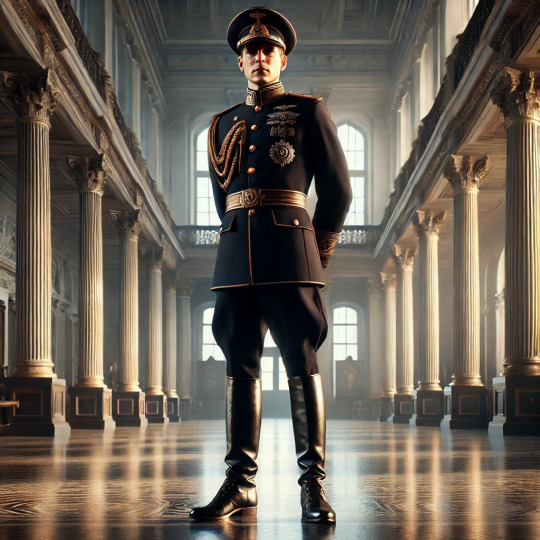
Hats and Helmets – Crowning Symbols of Power
There is no piece of attire more symbolic of authority and rank than the hat or helmet. These are not mere accessories—they are crowns of command, banners of dominance that sit atop the head of an Alpha male. In military tradition, ceremonial attire, or formal occasions, hats and helmets transcend function to become markers of hierarchy and unyielding authority.
For the Alpha, the choice of headgear is deliberate. Whether it is an officer’s peaked cap, a riding helmet, or a ceremonial bicorne, the Alpha selects a crown that proclaims his superiority, asserts his status, and demands deference from all who stand before him.
Historical Legacy of Headgear
Throughout history, headgear has been inseparable from power. Kings wore crowns, warriors donned helmets, and military leaders wore hats adorned with insignia, each element designed to project authority. From the feathered plumes of Napoleonic generals to the gleaming helmets of cavalry officers, these symbols were not only markers of rank but tools to instill awe, inspire loyalty, and enforce submission.
For the Alpha male, this tradition is not merely a relic of the past—it is a tool to be wielded. His hat or helmet does not just sit on his head; it dominates the space around him, serving as a visual reminder of his command.
The Components of Alpha Headgear
The Alpha’s choice of hat or helmet is not arbitrary; every detail is selected to enhance his commanding presence and reinforce his authority.
1. The Peaked Cap: Mastery and Precision
• The sharp lines of a peaked cap mirror the Alpha’s discipline and attention to detail. Its visor shades his piercing gaze, adding an element of mystery and menace.
• Adorned with gold braiding or insignia, the cap broadcasts his rank and achievements, leaving no doubt as to his superiority.
2. The Riding Helmet: Control and Elegance
• A leather riding helmet combines functionality with refinement. It signifies mastery not only over a horse but over all forms of control and discipline.
• Its streamlined design amplifies the Alpha’s aura of precision and readiness for action.
3. The Ceremonial Hat: Authority Embodied
• A bicorne or ceremonial hat, often associated with historical military leaders, speaks to the Alpha’s connection to tradition and timeless power.
• Worn with high-ranking uniforms, it completes the image of an unassailable commander.
4. The Combat Helmet: Prepared for Domination
• While less formal, a combat helmet reflects the Alpha’s readiness to enforce his authority through strength and action. It is a practical crown for a practical king, one who commands respect in the harshest conditions.
The Symbolism of Hats and Helmets
A hat or helmet is more than fabric, leather, or metal—it is a psychological weapon. For those beneath the Alpha, it is a reminder of his dominance, a symbol of the weight they must bear under his command. For the Alpha, it is a manifestation of his unyielding belief in his own superiority.
• Height and Command: The raised crown of a hat or the imposing bulk of a helmet adds height, creating a physical representation of the Alpha’s dominance over those around him.
• Visibility of Rank: The decorations, insignias, and embellishments on the headgear communicate the Alpha’s rank and accomplishments, ensuring that all who see him immediately recognize his status.
• Framing the Face: Hats and helmets draw attention to the Alpha’s face, highlighting his piercing gaze, chiseled jawline, and expressions of control and authority.
Rituals of Donning the Crown
For the Alpha, placing the hat or helmet upon his head is not a casual act—it is a ritual of dominance, a deliberate assertion of his role as leader and master. The very act of adjusting the brim, tilting the visor, or tightening the chinstrap becomes an unspoken declaration of power.
• Before Inspection: The Alpha adjusts his hat with precision, signaling that he is prepared to exert control over all he surveys.
• During Ceremonies: As the Alpha lifts his hat in salute or tilts it slightly in acknowledgment, he reinforces his connection to tradition and the hierarchy he commands.
• On the Battlefield: The Alpha’s helmet is not just protection—it is a crown of war, symbolizing his readiness to lead through strength and discipline.
Psychological Mastery Through Headgear
The Alpha’s headgear does not merely project authority; it commands submission. The sight of his hat or helmet can inspire awe, instill fear, and enforce discipline without the need for words.
• Subordinates’ Reaction: For those beneath him, the Alpha’s hat or helmet is a constant reminder of their place in the hierarchy. It compels obedience and discourages dissent.
• Opponents’ Intimidation: For those who dare to oppose him, the gleam of his insignia or the shadow of his brim is a warning—a sign of the authority they face and the futility of resistance.
• Commanding Presence: Even in silence, the Alpha’s headgear speaks volumes, asserting his dominance through sheer symbolism.
Sir Cedric’s Reflection
“My hat is not mere fabric, nor my helmet mere steel. They are crowns—not bestowed by others but claimed by my nature. When I place my cap upon my head, it is not to shield from the sun or cold. It is to proclaim that I am the master, the commander, the Alpha. My insignia speaks where words are unnecessary, my visor shades the gaze that strips defiance from those who dare meet it.
When you see my hat, understand this: it is not decoration. It is declaration. It announces to the world that I command, I control, I conquer. And should you doubt it, know that beneath this crown lies the unyielding will of a ruler who does not ask—but takes.”
The Alpha’s Crown
For the Alpha, the hat or helmet is not an accessory—it is an extension of his power, a tool of domination, and a crown of his unassailable authority. Through this single piece of attire, the Alpha leaves an indelible mark on all who witness his presence, a mark that reminds them of their place beneath his command.
#power#authority#command#discipline#leadership#mastery#alpha confidence#alpha mindset#alpha master#absolute discipline#alpha power#alpha leader#alpha dominance#alpha abuse#alpha force#alpha supremacy#alpha phallus#absolute dominance#absolutecontrol#absolute domination#narcissistic abuse#actually narcissistic#narcissism#white excellence#crush the weak#iron will#noweakness#nocompromise#nomercy#total control
12 notes
·
View notes
Text
Political Themes in Classic Literature

Alright, let’s dive into political themes in classic literature. For anyone who thinks old books are just dust-covered stacks of antiquated language, you are dead wrong. Let’s just take a step back and remember that some of the most impactful political ideas in history didn’t come from debates in dull government buildings—they came from books. Yes, literature! Think of classic novels as political soap operas, only with more existential crises and a lot fewer commercial breaks.
The political puppet show:
So, what do politics and classic literature have in common? Quite a lot, actually. Literature doesn’t just entertain; it holds up a mirror to society and shows us how messed up (or wonderful) things are. Whether it’s criticizing an oppressive regime, showing the chaos of revolution, or examining the moral dilemmas faced by those in power, classic literature doesn’t ( and literature in general should never) shy away from political themes.
One of the most intriguing things about classic literature is how authors use characters and plots to critique the political systems of their time. In George Orwell’s Animal Farm, we see the rise of a totalitarian regime, but with... animals. Yes, pigs. Orwell is talking about the Russian Revolution and the dangers of unchecked power. The pigs, who start out with lofty ideals of equality, end up becoming as corrupt and oppressive as the humans they replaced. The message? Power tends to corrupt, and absolute power tends to corrupt absolutely (a fancy way of saying that rulers, no matter how noble they start, can easily lose their way).
The Communist Manifesto by Karl Marx. Yes, it's not a novel, but it’s a key text in understanding political revolutions. Marx and Engels argued that class struggle would eventually lead to a proletarian revolution, where the working class would overthrow the bourgeoisie. While not a story in the traditional sense, its influence on revolutions around the world (hello, Russia, China, Cuba!) makes it an essential part of political literature.
When Chaos Reigns: The Politics of Revolutions:
Nothing gets the political waters flowing like a good old-fashioned revolution. Literature has long been a tool for expressing the chaos, confusion, and sometimes the sheer absurdity of these moments in history. Take 1984 by Orwell—again... This time, we’re in a world where Big Brother is always watching, and privacy is a thing of the past. Orwell’s vision of a totalitarian regime controlled by surveillance, propaganda, and fear was a warning about the dangers of political overreach. Fast-forward to today, and you’ll find that his bleak vision feels eerily close to the reality of modern surveillance states.
In The Tale of Two Cities by Charles Dickens, we see the French Revolution through the eyes of characters who are caught up in the violence and turmoil. Dickens shows us how the revolution, meant to bring about liberty and equality, quickly devolves into chaos and bloodshed. People who were once oppressed now become the oppressors. It's the classic "be careful what you wish for" scenario—and it’s not just in the French Revolution. Many revolutions, whether political, social, or even technological, have shown us how easily things can spiral out of control when the old systems are overturned without a clear plan for what comes next.
Russian literature is a goldmine for political themes that dig deep into societal struggles, personal turmoil, and the larger forces that shape history.
Take War and Peace by Leo Tolstoy, for example. Set against the backdrop of the Napoleonic Wars, this epic novel isn’t just about battlefield drama—it’s about the political and social upheaval (violent or sudden change) that these wars bring. Through his huge cast of characters, Tolstoy critiques the Russian aristocracy, showing us how disconnected the wealthy and powerful are from the suffering of ordinary people. As young men are shipped off to fight wars they don’t fully understand, Tolstoy paints a picture of a society that is as chaotic as the battles it’s embroiled in. The violence and chaos of war seem almost tame compared to the political and social systems that allow such events to unfold. It’s a sobering reminder of the divide between the political power held by a few and the lives of the many.
Then there’s Fyodor Dostoevsky’s The Brothers Karamazov, which takes us to a different kind of chaos—the moral and philosophical kind. In this novel, Dostoevsky explores the dangers of ideology, faith, and authority, which in many ways are just as politically charged as any revolution. As his characters wrestle with questions of belief, power, and their own place in the world, the novel digs into the political tensions within Russian society and religion. The political impact of The Brothers Karamazov was so strong that the Russian government kept a watchful eye on Dostoevsky himself, fearing that his questioning of church and state could stir up trouble among the masses. This book isn't just a deep philosophical meditation; it's a warning about the consequences of unchecked authority and the destructive power of ideology.
In One Hundred Years of Solitude, Gabriel García Márquez critiques the political systems of Latin America, focusing on the cyclical nature of revolution and power. The corrupt political systems in the town of Macondo reflect the repeated failures of revolution, where every new regime promises change but ultimately falls into the same patterns of oppression and violence. The novel shows how revolutionary ideals can quickly turn into systems of corruption, highlighting the disillusionment many felt with political leaders who fail to deliver true change.
Morality and Ethics in Politics: the good, the bad, and the politician.
In the world of politics, morality is like that pesky little voice in your head saying, "Hey, maybe don't do that thing." Ethics are the rules you kind of wish everyone followed, but let’s face it, not everyone does. Now, throw these into the mix of political decisions and you get moral dilemmas, the ultimate "What would you do?" situations. And when you throw characters into this, suddenly, you’ve got a drama that’s better than any reality TV show.
In Les Misérables, Victor Hugo presents the story of Jean Valjean, who, after stealing bread to feed his family, faces a lifetime of punishment under a rigid legal system (basically for breathing <3). His internal conflict highlights the tension between legal justice and moral justice. As Valjean navigates his path toward redemption, Hugo critiques the harshness of the justice system and the ethical responsibility of individuals within a corrupt society.
Similarly, 1984 by George Orwell delves into the ethical struggles of Winston Smith as he navigates a totalitarian regime where the very concept of truth is manipulated. Winston's journey, filled with the desire for freedom and individuality, demonstrates the cost of rebellion in a society that controls every aspect of its citizens' lives. His moral battle—whether to remain loyal to his beliefs or submit to the Party's lies—serves as a haunting commentary on the oppressive nature of unchecked political power and the moral corruption it brings. In such works, the characters’ ethical decisions become not just personal, but political, reflecting broader questions about justice, freedom, and the consequences of betrayal.(There are so many books I could talk about rn I-)
Impact on Political Movements: how did these books affect real life revolutions:
In the case of Les Misérables, the themes of social injustice and the failure of the French government resonated deeply with the working-class revolutionaries of the 19th century. The novel’s portrayal of the barricades and uprisings, even though ultimately unsuccessful, inspired a generation of revolutionaries who sought to topple the entrenched social and political systems. Hugo’s work became an emblem of resistance, one that resonated not only in France but across Europe during times of political unrest.
Uncle Tom’s Cabin by Harriet Beecher Stowe, similarly, had a profound effect on the political landscape of the United States. Its depiction of the inhumanity of slavery galvanized the abolitionist movement, forcing many Americans to confront the moral implications of the system. Stowe's vivid portrayal of the brutal realities of slavery made it impossible for the North to remain indifferent to the plight of the enslaved, playing a crucial role in building support for the abolitionist cause. The book became a symbol of resistance and solidarity, one that ultimately contributed to the outbreak of the Civil War.
Universal relevance: Politics doesn't have an expiration date.
The political themes in classic literature touch on things like justice, freedom, and equality. These aren’t just problems from the past; they’re timeless issues...
In The Grapes of Wrath, John Steinbeck explores the plight of migrant workers during the Great Depression, but its message about the exploitation of the poor is just as applicable to contemporary struggles against economic inequality (The exploitation of the poor doesn’t have an expiration date either, and it’s still something we’re fighting against in the modern world.).
Similarly, the themes in Pride and Prejudice by Jane Austen, though rooted in the social hierarchies of early 19th-century England, speak to universal themes of class, marriage, and individual agency. Austen critiques the limitations placed on women by society, calling attention to the ways in which economic power and social status restrict personal freedom. These concerns remain relevant today, as women continue to fight for gender equality and the right to autonomy in many parts of the world.
Why Does This Matter?
Okay, so we’ve explored how literature critiques political systems, critiques leaders, and explores the chaos of revolution. But why does all this matter to us today? Here’s the kicker: these books and their political themes still resonate. They’re not just dusty old novels you read in high school and promptly forget. They’ve got real-world implications.
Take a look around. What’s happening in the world today? Struggling to find decent healthcare? Check. Big corporations running the show? Check. Politicians who say one thing and do another? Double-check. We’re still grappling with the same political issues that have been explored in classic literature for centuries. Maybe we haven't had a Les Misérables-type revolution (yet), but we’ve certainly seen protests, uprisings, and calls for social justice echoing across the globe, just like in the pages of those old books.
And it gets worse...
Don’t think that the digital age has made these themes less important. If anything, social media and the internet have amplified the political issues that these classic books explored. Think about how politicians now use platforms like Twitter or Instagram to manipulate public opinion or deflect criticism. It’s almost like reading 1984 all over again, with the new-age "doublethink" of social media where truth is constantly bent and twisted. In a world of 24/7 news cycles, “alternative facts,” and fake news, it’s hard not to see the parallels with Orwell’s Big Brother.
Classic literature is not just for those who enjoy long-winded prose and tragic endings. It’s a treasure trove of political insight. From critiques of power to depictions of revolutionary chaos, these stories show us the triumphs and failures of human societies. They remind us that the fight for justice, fairness, and equality is far from over. So next time you crack open a classic novel, remember: it’s more than just a story—it’s a blueprint for understanding the political world we live in today.

The books mentioned and more if you're interested:
.Les Misérables by Victor Hugo
. 1984 by George Orwell
. Uncle Tom's Cabin by Harriet Beecher Stowe
. The Grapes of Wrath by John Steinbeck
. Pride and Prejudice by Jane Austen
. A Tale of Two Cities by Charles Dickens
. The Communist Manifesto by Karl Marx and Friedrich Engels
. Animal Farm by George Orwell
. The Jungle by Upton Sinclair
. Brave New World by Aldous Huxley
. To Kill a Mockingbird by Harper Lee
. The Prince by Niccolò Machiavelli
These are some links to more articles about this subject or close to it if you wanna read more about what we already see in real life lol:
#writers#politics#politique#writing prompts#writers on tumblr#writing#my writing#drink it write it#rambles#writer#les mis#liturature#books and libraries#literature#themes#seriously#article#tumblr girls#writer's block#writeblr#writerscommunity#writer prompts#trump#fuck trump#america#usa politics#world news
9 notes
·
View notes
Text
Raz Reads Les Mis (XIX)
Marius - The Grandfather and the Grandson
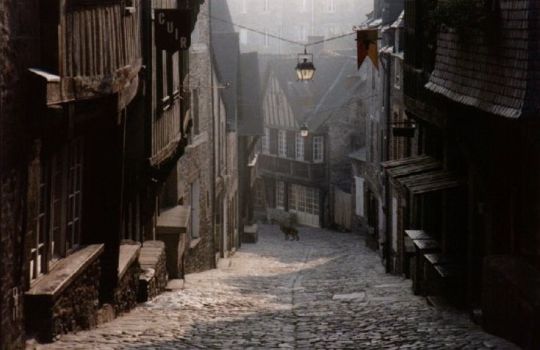
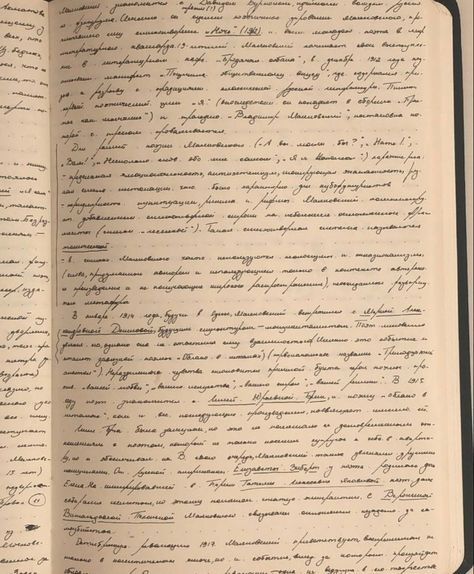
So Gillenormand is a royalist
Which if the Waterloo chapter is anything to go by, is not the greatest thing to be in this book
But if the opening chapter (do we remember bishop Charlie?) has anything to say, then being a revolutionary is not great either
(Do we call them revolutionaries or republicans?)
But Gillenormand goes to taverns often, the sort of taverns whose drinking songs are all about how bad Napoleon is
Agreed, but certainly not for the same reasons
This is important because Gillenormand's daughter marries Pontmercy
The Pontmercy from the Waterloo chapter
Who is certainly no royalist
But he's a modest man and wears a scar from a sabre across his face and looks after flowers in his little garden
And he has a son called Marius
The Marius that this part of the book is named for
Pontmercy the father gives Marius to the custody of Gillenourmand because Gillenourmand can furnish Marius with a better inheritance
The catch? Pontmercy can never speak to his son for as long as he lives
Marius grows up believing his father hates him because he's never made contact with him
And Marius is 18 now? Somewhere around there I think
A letter arrives
Pontmercy is dying and wants to see Marius
Between the few hours that Marius delays his visit, Pontmercy dies, leaving only a letter to Marius to do good by Thernadier
Thernadier, the person who pickpocketed a dying Pontmercy and who hurt my poor, lovely Cosette
After his father's death and after a character-building visit to a church, Marius comes to learn how much his father loved him and how his lack of visits were due to impossibility not disinterest
He looks at the history of the French libertarian struggle, of Waterloo and of Napoleon
His royalist upbringing has been shattered
He adds to his name the title of 'Baron'
And prints out 100 cards to announce this
But he has nobody to give the cards to
There is some scene about him having a cousin named Theodule whom he has never met and who is a favourite of a mutual relative
Theodule's biggest gripe with life is the fact that he wasn't named Alfred
Pick your battles I suppose
But this anti-royalist sentiment that Marius now holds is not doing well for his family life
"A baron and a bourgious cannot remain under the same roof"
Marius goes packing
Nobody told me that Waterloo chapter actually mattered to the story! I thought it was set dressing! Suspense building! Adding to the atmosphere! And now I find out it matters? There is also something to be said about the sadness of the missed connections of parents forced to give up their children. I can't help but think that the relationship between Marius and his father mirrors that of Fantine and Cosette. Where the parent gives up their child for what they assume will be a better life and yearn for them and that longing can't be realised. And only too late does the child learn how much the parent loved them. Tragic familial love is something I never considered in stories, but it has been something this book has done really well.
Side question, but did Hugo enjoy writing Les Mis? Reading this sounds like he's excited and he's passionate about the story, but I can't tell if that's how French literature just sounds (I felt the same thing reading Dumas) or if he's actually having the time of his life going through this story.
#raz reads les mis#les mis#les miz#les miserables#victor hugo#les mis book#literature#french literature#classic literature#books#reading#books and reading#booklr
12 notes
·
View notes
Text
Thoughts on Napoleon (2023)
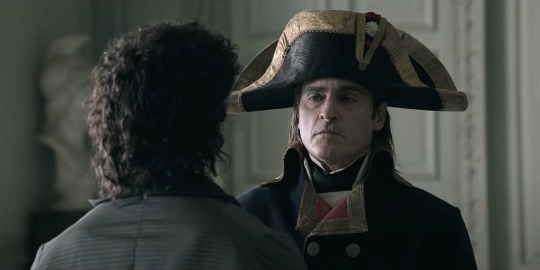
Saw the Napoleon movie last night and was pretty disappointed. It was my most anticipated film this year and wow... maybe the 4-hour cut is better? Because this movie just felt psychologically shallow and overly compressed. 2 1/2 hours just isn't enough time to cover three decades of history.
Not that this film is good history. I cringed at Ridley Scott's pathetic defense of his historical inaccuracies: "You weren't there, I wasn't there, stfu, I can do whatever I want." Did anyone tell Ridley about this thing called primary sources? Or historical records? Or biographies and history books? Like, THAT'S HOW WE KNOW ABOUT HISTORICAL EVENTS IN THE FIRST PLACE.
Like, I was prepared for basic inaccuracies when I saw how they depicted Marie Antoinette's execution in the trailer (no shorn hair, not in white). But man... they really oversimplify the French Revolution and never go into why Napoleon is such a fascinating historical figure, both revered and despised, with an incredibly complicated legacy.
Agnes Poirer's review has a great passage which sums up my frustration with the film as a Napoleon biopic:
"[Ridley Scott] even seems ignorant of the fact that there are two men in Napoleon: there is Bonaparte, a hero of the French Revolution who gave France and Europe institutions of the Enlightenment era that still exist today, and who liberated Jewish communities from their European ghettos; and there is Napoleon, the hero turned weary authoritarian ruler, whose military campaigns drained a whole nation of its youth and wealth. Beyond facts, Scott’s great historical deficiency is to ignore the politics; instead giving us Napoleon’s tactics on the battlefield as a mirror to his sex life. It’s inept, crass and boring."
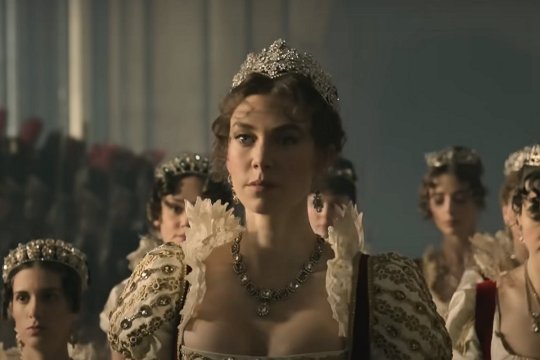
There's often the sentiment that historically inaccurate movies can be forgiven somewhat if they make for compelling drama. The problem with Napoleon is that the real history IS compelling drama and Scott's film is just shallow spectacle with the occasional goofy gag masquerading as satire. The filmmakers seem to be going for dark comedy, but the approach only sporadically works because much of the humor falls flat (I saw this in an almost full theater and the comedy scenes mostly played to dead silence-- I felt secondhand embarrassment for the actors at times). The humor just consists of Napoleon being awkward or shouting meme-able things ("DESTINY HAS BROUGHT ME THIS LAMB CHOP!" *tries to start food fight*). Yeah, The Death of Stalin it is not.
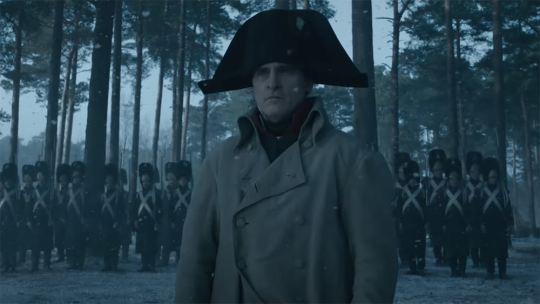
Joaquin Phoenix's performance is also one-note and static-- his Napoleon never seems to age, visually or inwardly, and he never captures the man's famous charisma, so I never bought that any army would possess an ounce of loyalty to him. Vanessa Kirby fares better as the alluring and tragic Josephine, but even her performance felt compromised and choppy-- probably due to this being whittled down from the 4-hour cut.
Aside from Phoenix's Grumpy Cat face Napoleon and Kirby's Josephine, none of the other characters leave much of an impression, good or bad. Historical figures flit in and out of the story, barely making more than uninteresting cameos. I felt like I was watching a clipshow for a miniseries, not a self-contained movie. If you don't know the basic outline of the history being depicted, I can only imagine how confusing this movie must be.
Ugh, this was just so disappointing! I was never bored while watching it, but I just left the theater empty. The more I think about it, the less I like it.
25 notes
·
View notes
Text
The Palace of Versailles
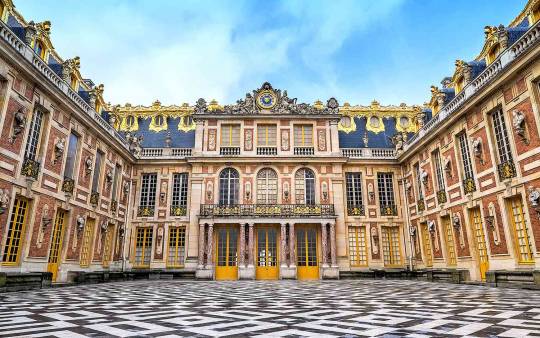
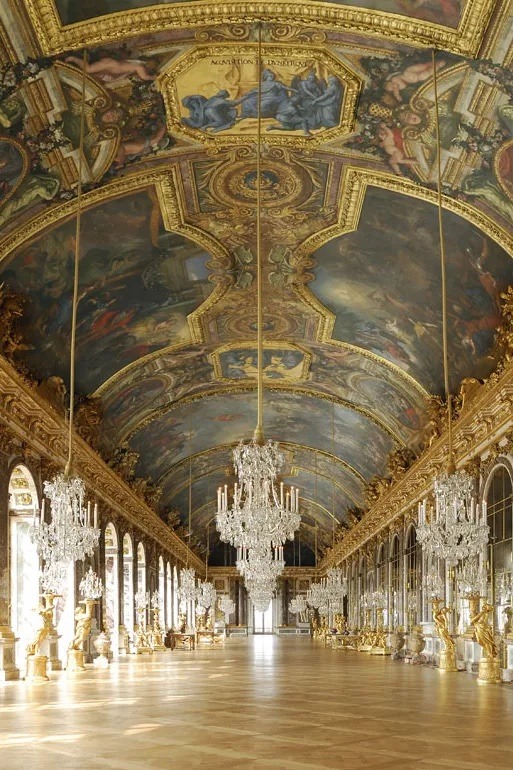
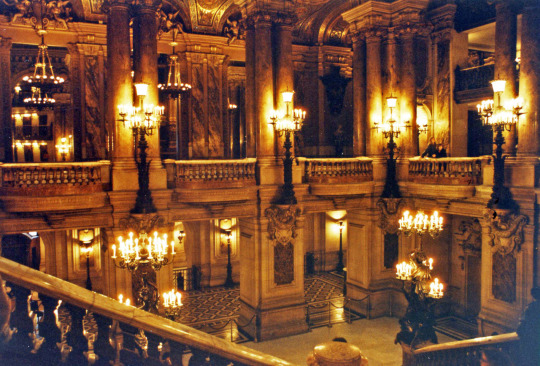
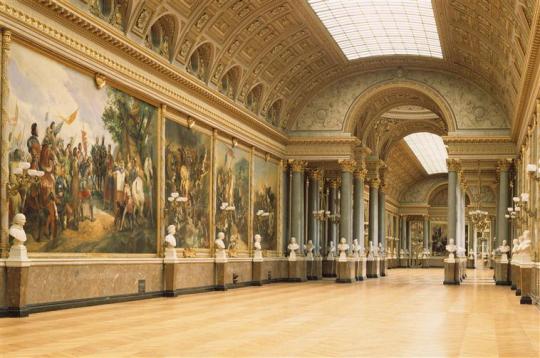
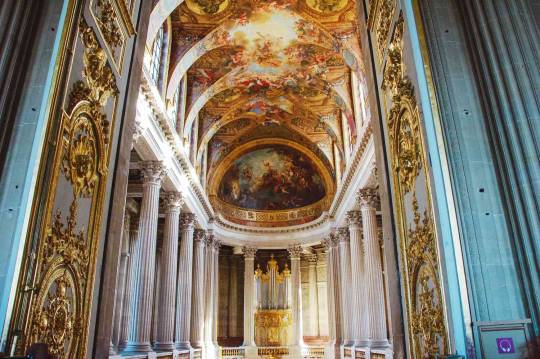
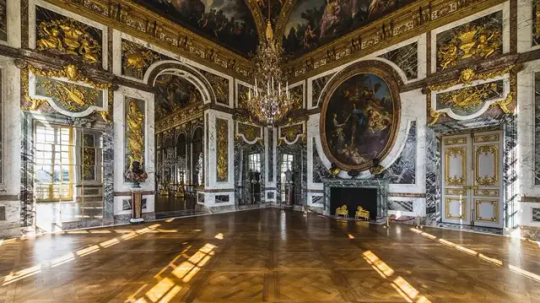
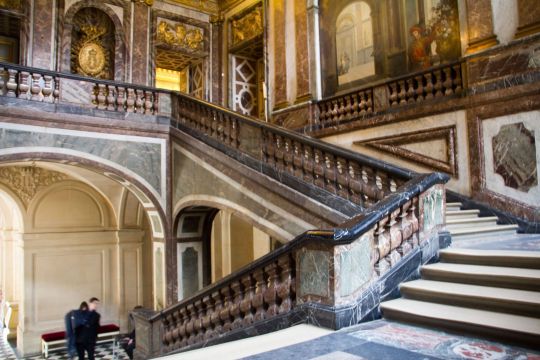
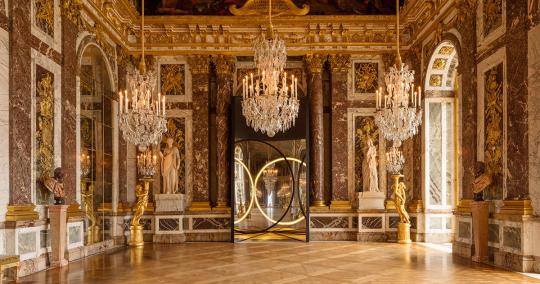
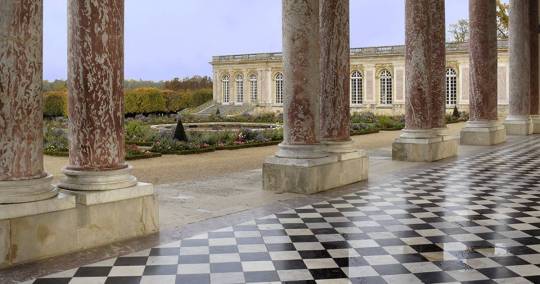
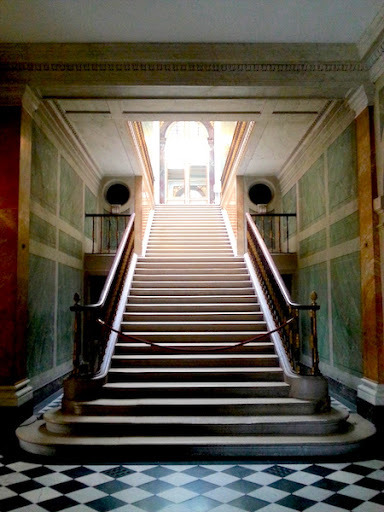
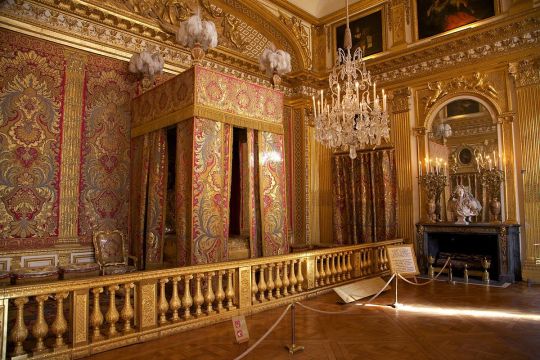
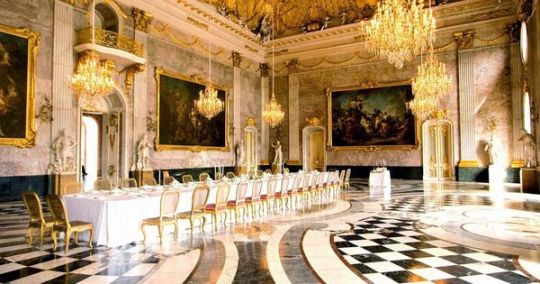
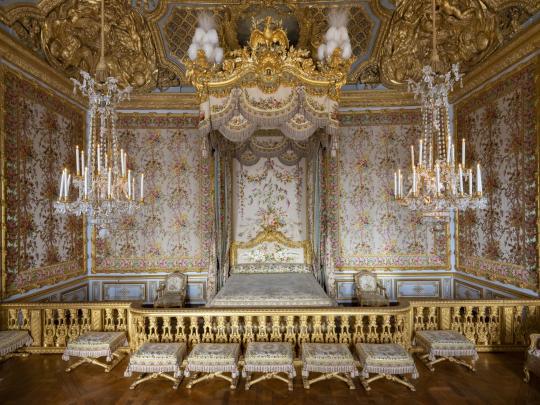
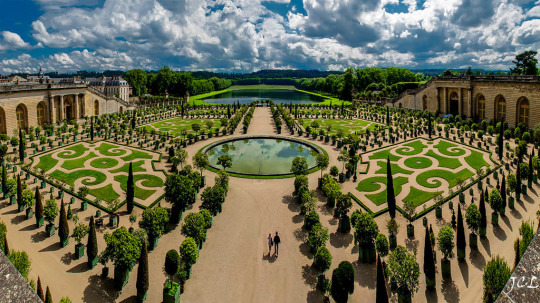
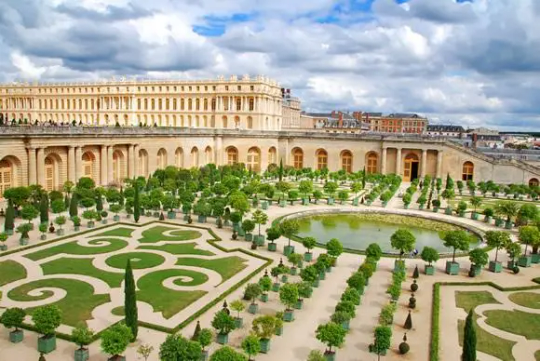
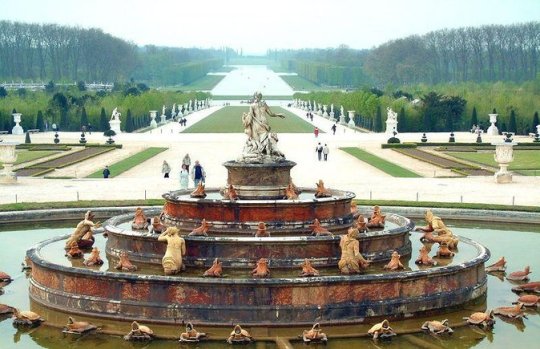
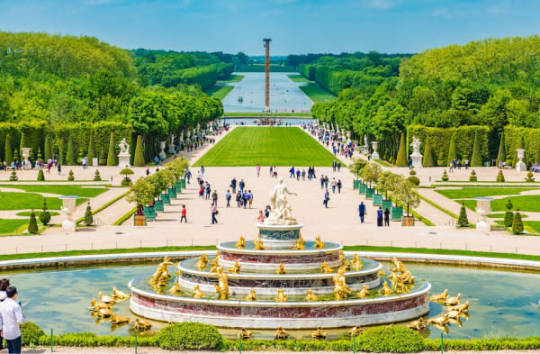
The Palace of Versailles is located in Versailles, France. The royal château served as the seat of French political power. The palace was originally built as a hunting lodge for King Louis XIII and enlarged into a royal palace by Louis XIV. The château went through many expansion phases. The second phase in 1678-1715 saw two enormous wings added. Although the cost was extraordinary, it was decided the château should serve as a showcase for France. All the materials that went into construction and décor were manufactured in France. One of the most costly elements was the silver furniture and silver balustrade used by King Louis XIV for the grand apartments. The palace has a long history, with the royal family forced to leave Paris during the French Revolution. When the monarchy fell, Versailles Palace fell into ruin, and most of the furniture was sold. In 1810, Napoleon began restoration work, which continued under Louis XVIII in 1820, but it wasn’t until King Louis-Philippe that true efforts began. The Fifth Republic made further restorations in the 1950s and promoted the château as a museum. In 2003, a new restoration initiative began. The palace boasts 700 rooms, 67 staircases, and 1,250 fireplaces. The original façade, red brick with cut stone embellishments, has been preserved. The eastern side of the palace has a U-shaped layout with secondary wings and a black and white marble courtyard. Throughout its history, there have been five chapels on the site, the current one built in the Baroque style by King Louis XVI. The castle is also known for its Hall of Mirrors. This gallery is 230 feet long and holds 17 arcaded mirrors, while the ceiling is painted with 30 scenes from Louis XIV’s reign. The Royal Opera was completed in 1770. The castle has many opulent apartments, from the king’s private rooms to the staterooms. The palace gardens boast water fountains and an orangery. #PalaceOfVersailles #castles #palaces #museum #France #Versailles #history
10 notes
·
View notes
Text
A Real-Life Barefoot Contessa
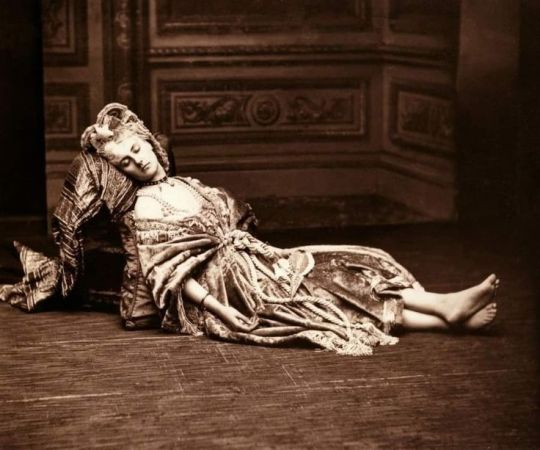
Well, what can I say. She's fabulous.
The Fabulous She I refer to above is the Contessa di Castiglione, who, were she living today, would be making millions on Instagram, TikTok, YouTube, and a gazillion other social media platforms. Being that she lived during the 19th century (1837-99), the Contessa had to settle for the reproductive mass media tool of her time—Photography. It was a medium with which she became familiar and whose function, beyond that of utility, she grasped profoundly. But not as a mere recorder of reality. No, for her it was an instrument of fantasy: Of role-play and the projection of a kind of imaginative truth—the truth of the Inner Self. That Being we see not in the mirror or in the eyes of others, but in our minds. The Self not known to mundane existence but as the most personal, intimate, and rarefied form of Art.
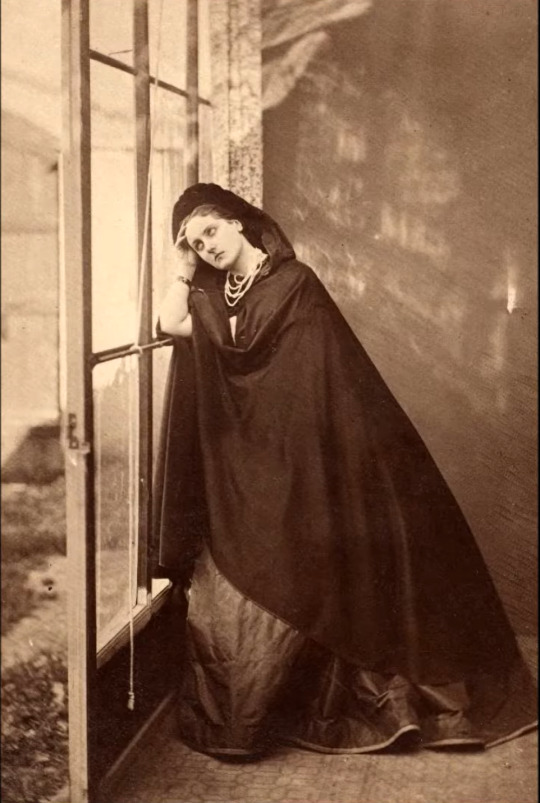
Over the course of some thirty-odd years, the Contessa had about 700 photographs taken of herself, in all sorts of costumes, in all sorts of poses, in all sorts of moods. She would wear her most extravagant gowns, she would stage herself in tableaux taken from history, theater, literature, and from her own life; she would present her bodily parts (mainly bare feet and legs) as brazenly fetishized objects; and she would frequently be seen gazing—at the camera, towards the distance, and at herself, reflected in hand mirrors and pier glasses. She fashioned herself as a self-image within another self-image, a self-referential, self-knowing portrait of who and what she was—a creator of herself as an Object of Art.
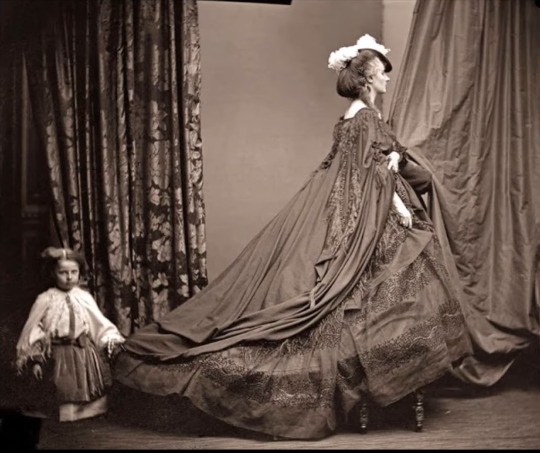
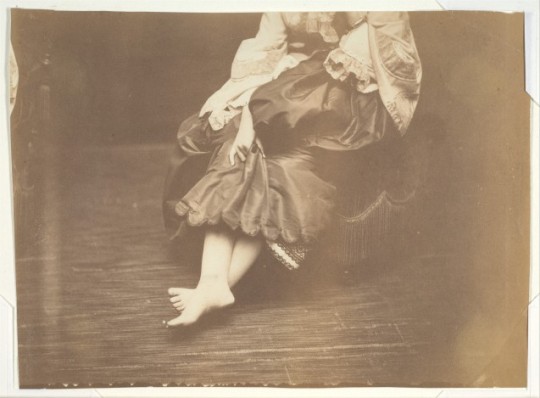

Our Contessa did have an interesting, pre-photography history. Born Virginia Oldoini Rapallini to minor Italian nobility, she was wedded, not of her choice, at age 17 to the some-12-years-older Count Castiglione, a union that produced one son and much unhappiness for an ill-matched pair. But when, at the urging of a diplomatic cousin, the Contessa arrived, in 1856, at the court of Emperor Napoleon III, to argue for the cause of Italian unification, she came into her own. Beautiful (extremely), witty, willful, and daring, the Contessa quickly slipped between the Emperor's sheets, while titillating the French aristocracy with her flamboyance, her outrageous fashions, and, even then, her complete self-absorption. You could call her the Kardashian of her time, except the Contessa was (and is) way too cool; no vulgar Kardash of today has one tittle of the Contessa's elegance, style, taste, and her utter sense of being—Fabulous.

Such Fabulousness, however, then as now, had a price. In a matter of months, the Contessa's affair with the emperor had fizzled, her husband had separated from her, and various scandals (mainly to do with her dramatic costuming, or presumed lack thereof) sent her packing from the Court. Within a few years, she had retired to a solitary anonymity in the Parisian suburbs. Although she continued to correspond with influential friends and lovers, she was soon forgotten by a world she had once dazzled.
But it was then she began her real vocation: To have herself—her life, career, legend, her imagined Being—inscribed in the most sophisticated recording medium of her era. With her reproduced images being sent to family, lovers, and friends, it was thus the myth of the Contessa was born—leaving to posterity, in nearly 700 photographic images, her tribute to the Self, a paean to Narcissism, as complete, obsessive, and solipsistic a voyage of Self-Creation as can be imagined. For which we can all be grateful.
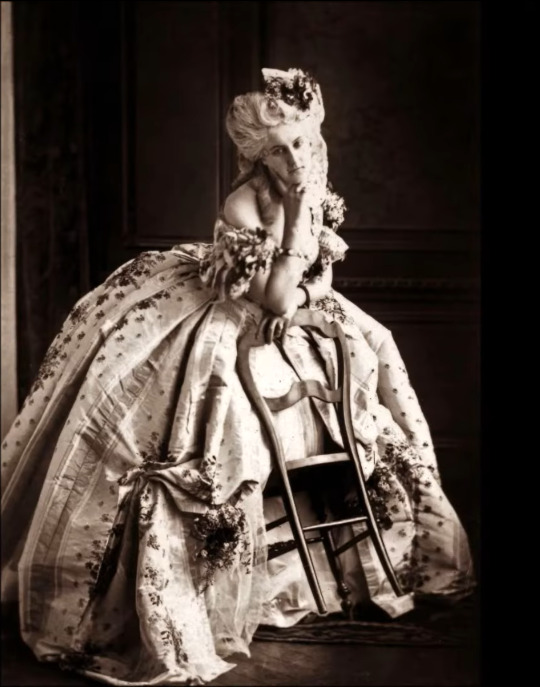
Even when the lady had passed on, to that great photographic studio in the sky, recording media was still obsessed with the Contessa. The 20th century has taken advantage of her legend and allure to construct several films around her life, two of which I have seen. Both these films—La Contessa Castiglione of 1942, and The Contessa's Secret (also known as La Contessa di Castiglione) of 1954—follow her pre-photographic activities at the French court and her relationship with Napoleon III, while also touching on the cause of Italian unification (the putative reason for her Imperial seduction). Not that the Contessa lacks for other company; in each film a dashing young beau makes sure she's never at a loss during her down times. Another kind of Unification comes to the fore here.

I can't say how accurate either film is about history or biography, as each one (made in Europe) is dubbed in non-subtitled Italian, a language I don't know. I suspect, however, that for each History is merely an armature, a tailor's dummy (almost literally) to display the Contessa's stunning costumes, hair styles, jewelry, and fabled beauty. What the films lack in concrete Risorgiomento history is more than made up in their imaginative recreations of Risorgiomento fashions, style, and manners, an emphasis filtered, I sense, through a box-office consciousness of where audience interest will lie.

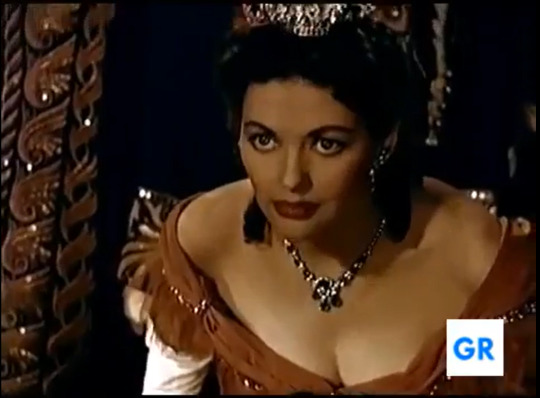
Such interest is foregrounded in the two actresses who portray the Contessa—Doris Duranti in 1942, Yvonne de Carlo in 1954. Both are amazingly beautiful women (which, no doubt, would have pleased the real Contessa), yet each one in her film is different in her look, performance, and image. They're almost reverse copies of each other: The slender Duranti is as pale as a Wili, with the delicacy of antique lace and the brittleness of an embroidery needle; whereas the fleshy de Carlo is dark, round, and energetic, an endearing touch of middle-classness in her style. The performances may not be the same, yet each one individually satisfies a fantasy of High Romance: If Duranti is a drooping lily, too frail and exquisite for everyday mucking-about, de Carlo is fiery, eager, sincere, an American-Canadian housewife's ideal of aristocratic passion, adventure, and glamour.

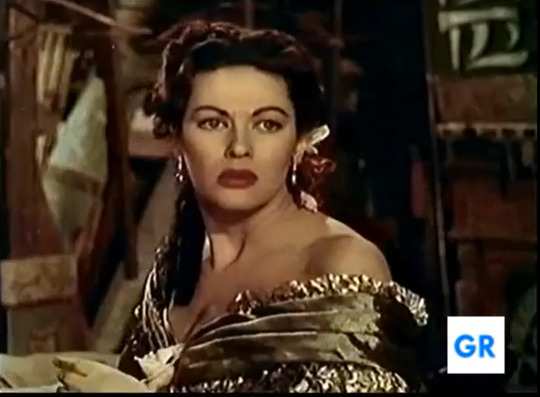
Is either portrayal anywhere like the real Contessa? I suspect not. Each performance arises from a 20th-century notion of Romance as portrayed in the Woman's Film genre—in which Life is a serial melodrama, a self-absorbed Theater of Emotion enacting scenes of Love, Passion, Despair, Renunciation, and Transcendence. Neither film touches on the Contessa's later career as a self-acting photographic model, yet curiously, each film does refer to Acting. In the 1942 film the Contessa is seen posing in what look like tableaux staged for the amusement of the French court; in the 1954 version she's seen attending elaborate theatrical performances. Artifice, as well as Art, is never far from the glittering boundaries of the Contessa's imaged self.
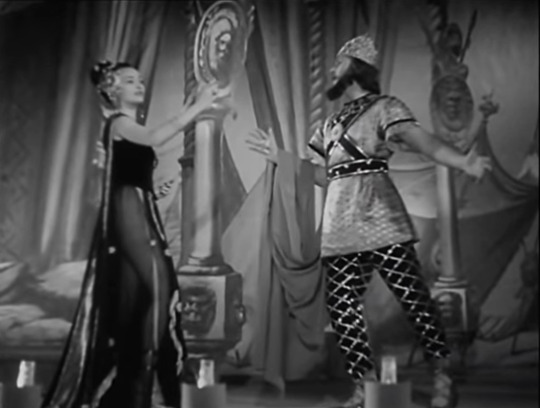
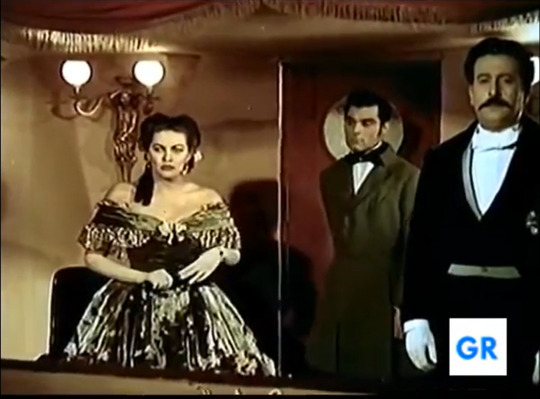
I'm guessing such scenes were inserted as commentary on the dramatic situations within each film. Yet, from another perspective, they can also be (foreshadowing) critiques of the Contessa's later photographic obsession, in which she depicted herself in scenes of what can be called a private Theater of the Mind: Portraying herself as gay, solemn, seductive, pensive, flirtatious, and, perhaps most alluringly—as detached; a distant object whose cool, blank gaze at the camera (and spectator) seduces us by its very remoteness. Gazing ourselves at these self-acted scenes, we might ask—how much of what we see is the actual Contessa, and how much is what we project onto her? Is the Contessa acting out self-fantasies for her own secret pleasure? Or is she 'acting,' as did Duranti and de Carlo, for a possible public, to view and witness her images, which become in turn embedded in our own fantasies of who this fabulous being is?
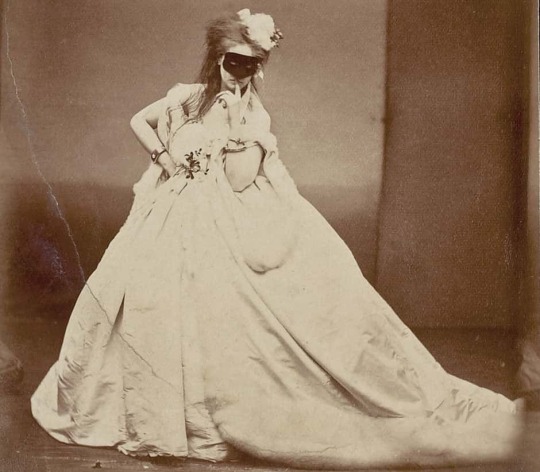
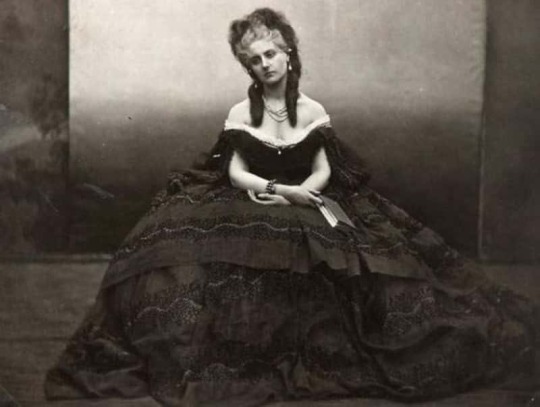
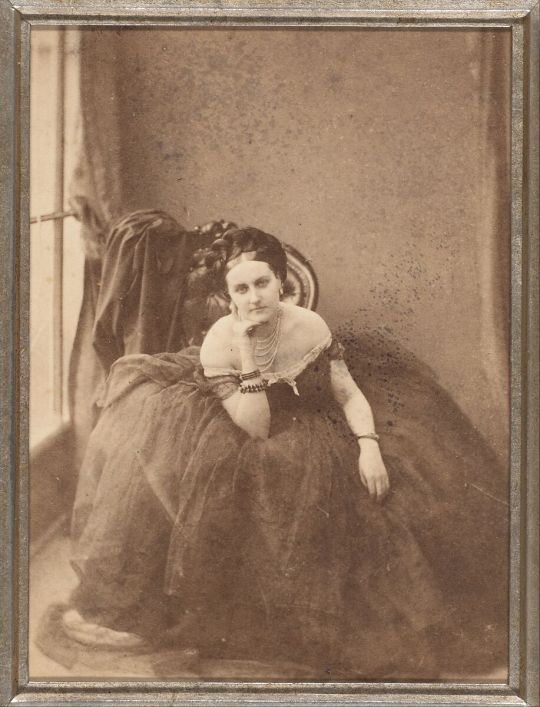
I've no doubt were she alive today, the Contessa would be making videos of herself on YouTube, home movies, as it were; creating, once again, a self-image for her admirers, aided by the marvelous additions of motion, color, and sound. What would they look like? What facets of this complex, complicated personality would be on view? Would they be bold, opinionated, spontaneous? Would she be commenting on current events, or indulging in gossip, or handing out beauty tips for self-improvement of the masses? Or would they be like her photos—silent, mysterious, teasing, contemplative, self-absorbed; indeed, self-enchanted with her changing, changeable, yet somehow always unchanging Self? We can only fantasize ourselves as to what they would be. As well as to what we would, within our own minds—see.
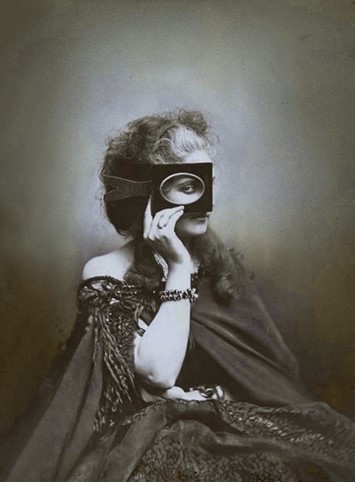
You can view more photographic images of the Contessa here. I've also written more on the Contessa di Castiglione, and the two films on her life, here at my Grand Old Movies blog. Because someone so Fabulous deserves to be written more about.
#Contessa di Castiglione#black and white photography#photography#19th century#Risorgiomento#Napoleon III#melodrama#woman's film#history#2nd Thoughts#self portrait#self love
6 notes
·
View notes
Text
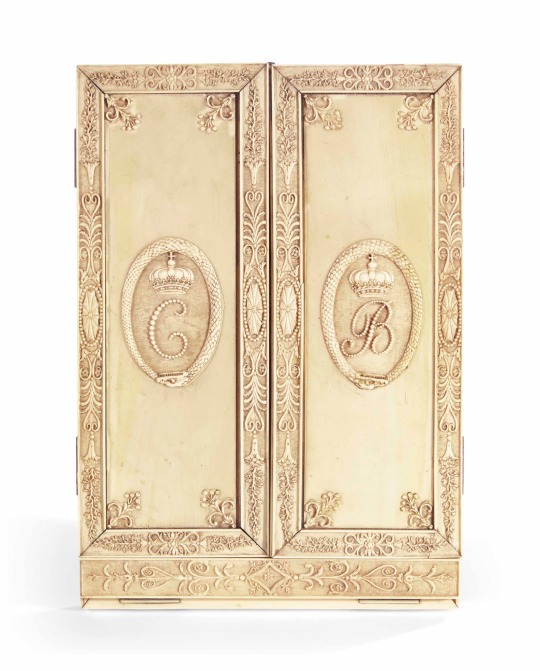
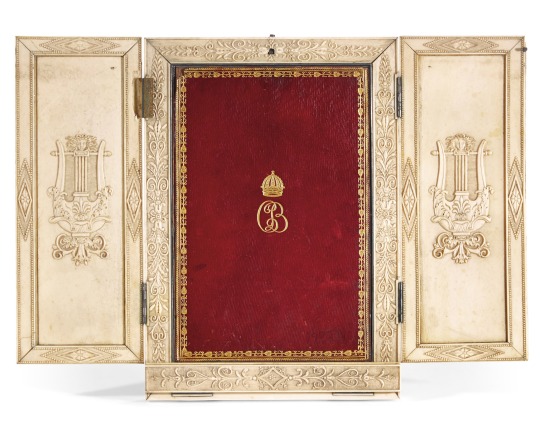
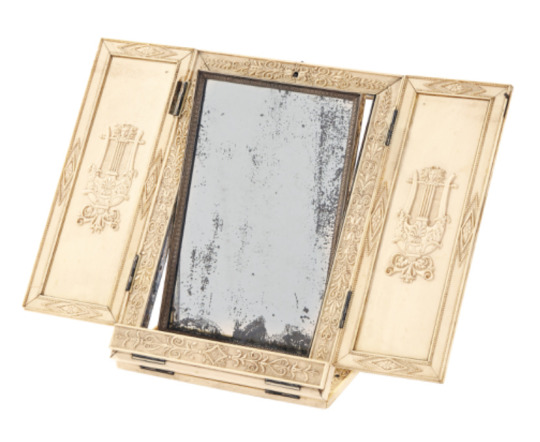
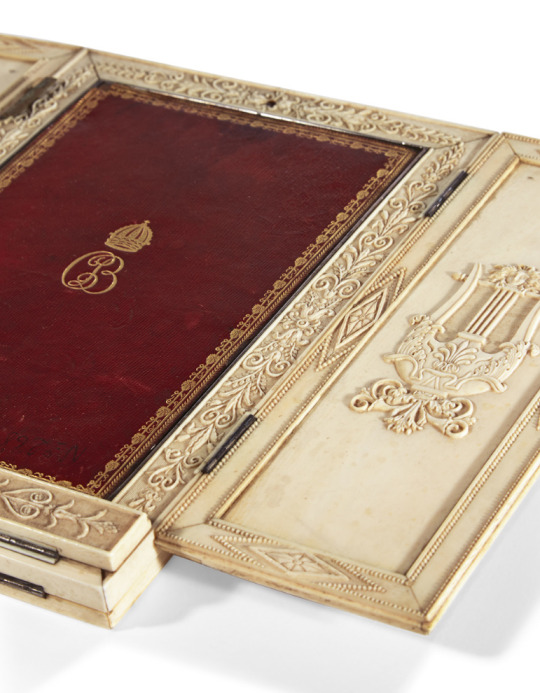
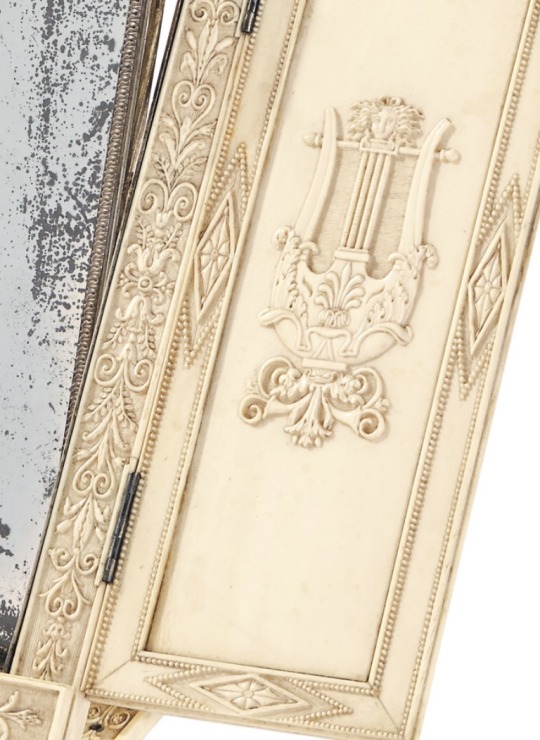
First French Empire era travel mirror. Monogram of Caroline Bonaparte.
(Christie’s)
#Caroline#Caroline Bonaparte#Caroline Bonaparte Murat#travel mirror#mirror#empire style#napoleonic era#napoleonic#Napoleon’s sisters#first french empire#french empire#19th century#1800s#Christie’s#auction#france#history#french history#artifact#napoleon#art#neoclassical#neoclassicism#empire
101 notes
·
View notes
Note
any film/book/tv recs?
ooh thanks for the ask! Honestly I consume media across all genres, so I'm not sure if there's a specific vibe you're after, so I'll just list a couple of different things I really enjoy:
books:
all of Donna Tartt's books obviously :) TGF and TLF are my favourites, but TSH is of course a classic
Wind, Sand and Stars by Antoine de Saint-Exupéry (referenced in TGF and is the most beautiful prose work I've ever read, no joke)
Illuminations by Arthur Rimbaud
Orlando by Virginia Woolf (incredibly funny but very heartfelt and is a beautiful reflection on humanity, time, youth, and identity)
The Outsiders by S.E. Hinton (can't believe I only read that for the first time this year)
Max by Avi Duckor-Jones (written by a New Zealand author and is a wonderful coming-of-age story featuring themes of sexuality, family, art, and indigenous NZ culture)
Wir Kinder Vom Bahnhof Zoo by Christiane F. (English title: Zoo Station) - memoir concerning the crisis of teen heroin use in West Berlin in the 70's. Big TW for many topics, so please look them up if you're thinking of reading it
Mysterious Skin by Scott Heim (many TW's also apply, but it's a beautiful novel)
Boy Swallows Universe and Lola in the Mirror by Trent Dalton - Australian contemporary litfic, the first is semi-autobiographical, and the latter features a young woman protagonist and centres topics of female homelessness and domestic violence against women
These Violent Delights by Micah Nemerever (perfect for fans of The Secret History)
The Inseparables by Simone de Beauvoir (only recently discovered a few years ago, and is semi-autobiographical account of her and her best friend's friendship growing up)
movies:
Let the Right One In (2008) - Swedish, fantastic vampire film
Napoleon Dynamite (2004) - hilarious, cult classic, what else is there to say?
Running on Empty (1988) - very gentle, I love River Phoenix
Dating Amber (2020) - funny and heartwarming comedy, with mlm/wlw solidarity and friendship at its heart
Thelma & Louise (1991) - such a rollercoaster, with amazing women as the leads, good focus on friendship, purpose, and self-actualisation
The Lost Boys (1987) - iconic, summer vibes are amazing, love me some campy 80's films, the Walk This Way hazing scene lives in my head rent-free
My Flesh and Blood (2003) - a documentary film about a woman named Susan who fosters a group of children, many of whom have disabilities or terminal illness. I love the way it was filmed and how it portrayed the realities of the situation, neither glamorising it or revelling in misery.
Mysterious Skin (2004) - adaption of the book I mentioned before. HUGE tw for sexual abuse/pedophilia. It's extremely respectful of the issues at hand, and is overall a beautiful work of art with incredible performances
tv:
honestly I haven't been watching many TV shows recently, but my favourites are:
NBC Hannibal
Twin Peaks
Gravity Falls
Druck (Skam Germany)
there are others but for some reason I can't think of any sorry :((((
5 notes
·
View notes
Note
Maybe this is just a flight of fancy - but your post about Kuma just made me think about how One Piece just abandoned it's more dialectical, for a lack of a better word, direction - instead of a tyrant being somebody who in the irony of history leads to revolutionary change, ala Napoleon, Nobunga, Cromwell or even Ghenghis Khann - he instead must be just a martyr - and not a Jesus, because a Jesus turns tables over and is not allways "nice", but just a caricature of some "Nietschean" "slave morality".
This can just be seen with how Luffy more and more turns from the amoral (not imoral) free spirit that never wants to be a hero and just liberates the world by his self consiousnes dominating the stagnatn oppresion, into a generic saviour, destined by literal prophecies that are fulfilled to the T, and not just by the end of history more abstractly - like hell somebody noticed how "the will of D" was basically overshadowed with the Nika stuff - from smiling because you are content and know that history will redeem everything, to just smiling because it is the magic system in a very boring and surface level way...
So yeah, even if my ideas may sound strange I'll finish that I agree - Kuma was kinda changed from a charachter that was introguing into one that may be more sympathic but ultimately less interesting - a mirror to the Gorosei, who were a human yet poignat critique of real politiks turning people into monster, who go against their compasion, that did destroy Ohara even thought they didnt want to out of a twisted "duty", into the saturday morning literal demons that call people "insects" - and as the devil that tortures souls in hell isn't really evil, so isn't an anti-semitic caricature that has a paralyzing stare - as "evil" as King Geedorah or Godzilla, just a rubber monster, not the evil in all our hearts...
Eh, i agree with some, disagree with some of the other things.
One thing i do disagree with, is the idea that the gorosei being pure evil is a problem. It's not, it's only a problem if all of them are the exact same in personality as Saturn.
The problem with Saturn is not the fact that he's pure evil, and like the rest of the celestial dragons he has a god complex, it's that he's boring.
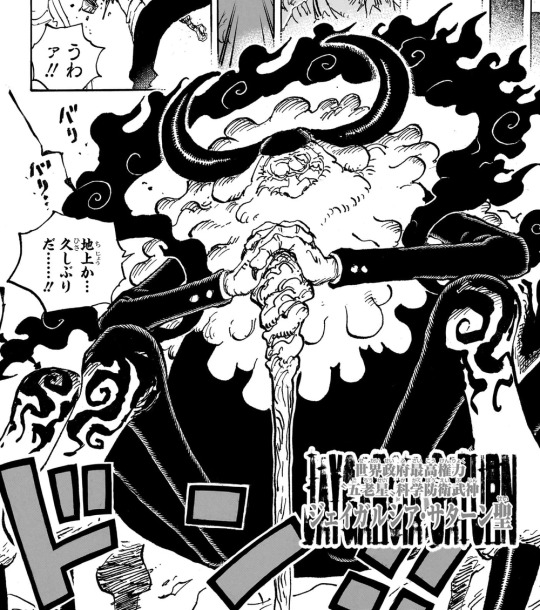
He's just an evil asshole, who is pure evil, and frankly, his actual main purpose seems to be introducing the magic system that his side has hoarded for themselves, so that we'll have had a taste of it by the time the final conflict takes place.
The problem with Saturn is that there isnt much to him. What glimpses we see from the rest of his circle is that the rest of the gorosei have actual real opinions on the world that is in some part based on good intentions, or at least an appeal to the greater good. By contrast Saturn is just a Celestial Dragon with actual power behind him. no more, no less.
and there are ways to make that sort of characters compelling.
the youtuber Lowart, during his retrospective on the archie sonic comic breaks down pretty well how the Brotherhood of guardians from that franchise are quite frankly assholes... but it's the most extreme member of this extreme group, Locke, who is the most compelling character of the bunch, speciffically because he has been molded by his groups century's long ideology into becoming who he is. the logical end result, of a long line of extremism, who believes that the ends justify the means at any cost... and then explores how this completely ruined his, his wife's and his sons lives.
By contrast saturn is just an asshole, who does assholish things, because he is an asshole.
also as for him being an antisemetic charicature, his devil fruit is clearly a gyuki-oni, a demonic, bovine spider monster from japanese legends.

They really do look like that. they have been a part of Japanese folklore LONG before they even knew jews existed.
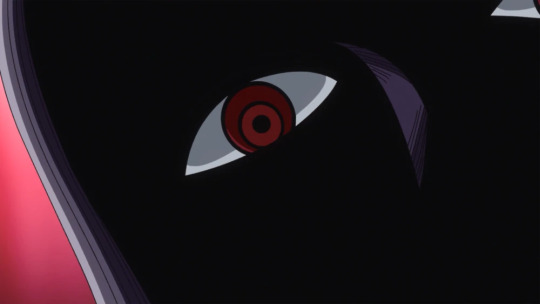
By sharp contrast, to saturn, while Imu hasnt been fleshed out in full yet, it's very clear that the monarch of the world has a much more distinct personality, with hopes, dreams, and has very distinct reasons to hate the people he/she does... but you also get the sense that Imu is a very lonely individual, who despite hard words, very clearly misses Lili, and seems to see Vivi as some form of getting to do things over again.
In other words, an actual character, as opposed to Saturn's Im fucking evil guys! look at me! im EVIL!!!
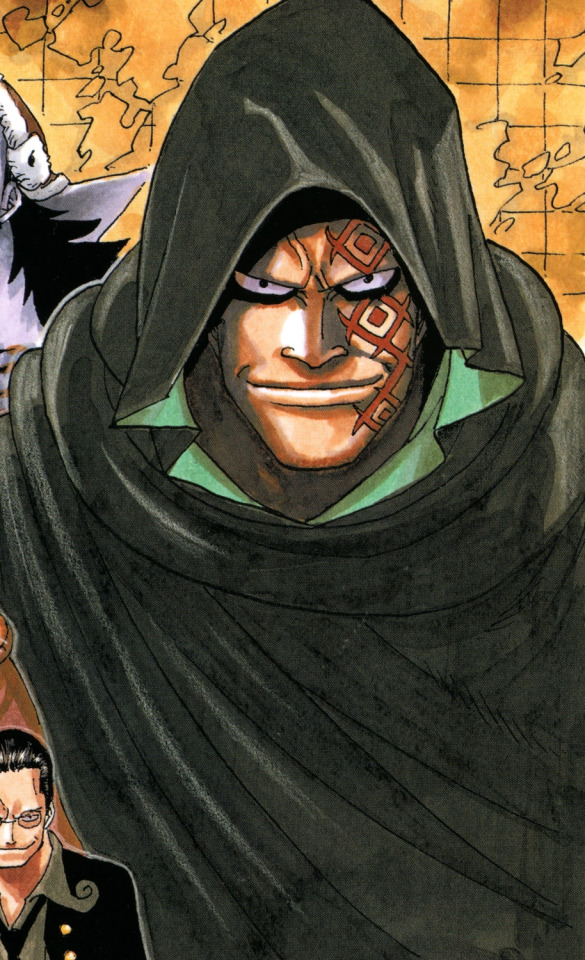
No in terms of good and evil, the larger problem is that the world government's opposition has lost as lot of their greyness as the story went on.
Dragon was a man who's actions was portrayed as a lot more grey than Kuma, a man who didnt mind his son becoming a pirate so long as he actually went out to see how the world was for himself, who talked nonchelantly with his subordinate about having brutually toppled a regime in a coup in their quest to destroy the world government.
There was a sense that he was on the right side of this war... but that he had no problems with shedding blood to get the war done.
Now this trait hasnt exactly been removed, but the way the manga portrays Dragon and his faction's actions has. Now rather than a bloody conflict with lots of intentional civil wars, post time skip it's portrayed more by relatively bloodless coups that doesnt kill that many people.
just look at kuma's flashback, where the king of sorbet was removed twice, and came back a third time, all because dragon didnt have him executed the first time.
The fact is, Oda did not need to make this conflict one of black and white, and it didnt have to become that, even as we saw the true, irredeemable evil at the WG's top.
I think the single biggest showcase of what a bad idea this was, is that Oda could have used the revolutionary army's raid on mariejois as a massacre, where they freed the slave, but also put as many world nobles to the sword as possible. as it is, it makes no sense for them not to do so while at the heart of their enemy's homebase, other than that this would have made them look very, very brutal.
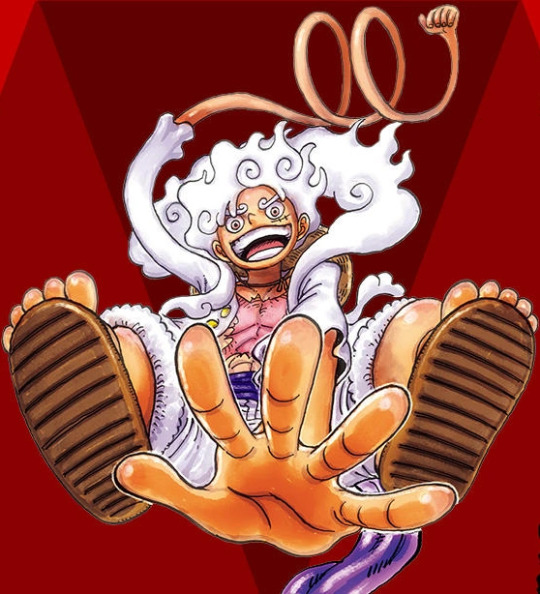
and yeah, im not a fan of nika, or how it overshadows The Will of D.
The powerset of gear 5 is actually great, but It did not need some grandiose backstory that connects Luffy directly with the previous great figure.
I disagree though that luffy himself has become some savior hero. On the contrary, luffy's main storyline post timeskip is how he keeps dedicating himself to assassination plots against his political rivals, on his way to become pirate king.
That is the actions of a pirate, not a hero.
The problem is the fact that due to Nika, now he is entangled to become the next joy boy, not due to his own, personal qualities, but instead due to the devil fruit he ate... which is so much less compelling, and in turn makes Whitebeard denouncing Blackbeard as not able to suceed roger despite his name, as much less compelling.
#one piece#meta#saint saturn#monkey d luffy#monkey d dragon#sun god nika#the will of d#questions and answers
6 notes
·
View notes
Text
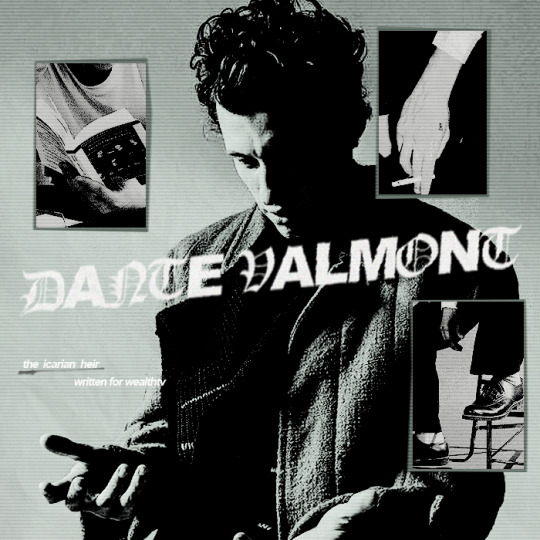
⠀⠀⠀ ◜ ♱ : ⁱᶠ 𝔤𝔬𝔡 is a 𝙵𝚁𝙰𝚄𝙳, 𝗮 𝗺𝗮𝗻 is 𝘢 𝘥𝘰𝘨 then i'm a 𝐋𝐎𝐒𝐓 𝐂𝐀𝐔𝐒𝐄
◜ ♱ : 𝗗𝗢𝗦𝗦𝗜𝗘𝗥.
full name. dante theodore kenway valmont. meaning. enduring \ a gift from god \ hill of the vale. nickname. dan or danny ( absolutely despises. ) any sort of reference to the divine comedy ( also hates. ) mr. darcy age. thirty2. dob. october twenty - sixth, making him a scorpio. pob. redbridge, london. pronouns. he / him. residence. previously mayfair, london now resides in manhattan ( upper east ), new york. education. classics ( history of art ) & law at cambridge. occupation. board member of valmont co., investor & entrepreneur/shareholder of a few start - ups ( de wolfe record label & oasis reverie art gallery ), being a sneaky cunt. orientation. bisexual, biromantic. hardly gives a shit.
◜ ♱ : 𝗥𝗨𝗠𝗜𝗡𝗔𝗧𝗜𝗢𝗡.
height. six foot, two inches. clothing. old moneycore: relaxed tailored slacks and handcrafted sweaters. wool coats and the occasional washed vintage levi's 501s with black loafers. as if 90's richard gere & hugh grant came back with a vengeance. scent. tom ford's oud wood eau de parfum, mixed with the asectic bite of lingering malboro gold. noticable features. dimples around the smile when he's about to lie through his teeth, small circular burn marks around his hands from younger, navy blue eyes inherited from his father. motifs. dogs, blood's thicker than water, " if i cannot inspire love then i will cause fear ", black coat / inherited clothes that's slightly too big, shattered mirrors shards in the knuckles & flashing lights buzzing in the ear, paintings overshadowed on walls, revelations in the static. akin to. napoleon usher ( tfothof ), kendall roy & nate sofrelli ( succession ), sebastian ( cruel intentions ), don draper ( madmen ), michael bluth ( arrested development )
◜ ♱ : 𝗔𝗡𝗧𝗘𝗖𝗘𝗗𝗘𝗡𝗧.
you only live twice, or so you've been told. a young blighter in middle class england, another product of a single mother and absent father fate. hardly destined for much when the world couldn't give less than a supersilious shit about you. backed into a corner by playground bullies far taller, you get mean when you become nervous. come home from school with sickly purple and green blossoming around the eye, a prideful grin on the lips. find a man tailored in dark green waiting in the kitchen, bumming a burning cigarette with your mother ( eyes hardly met, why aren't they met ? ) you're told to pack whatever's necessary, get prepared and say goodbye, dad's here to take you home with an opportunity of a lifetime.
the first of four. old habits don't die with the old man, they fucking repeat. seen as revenues before bloodline, his hand settles above your bruised eye before reshaping you entirely and it's the closest thing you'll call familial affection. leashed with a ralph lauren tie and sent off to the best school bloodied money could buy. to be a valmont was to learn how to kill; not with a fist but with a smile ⎯ deceive to slip the knife in their back before realisation pours out.
call it american cynicism: it's just friendly competition held between siblings, headlines printed with your father's reserved grimace shared to the press. the eldest heads off to cambridge, studies the classics of art and readies himself with a degree in law ( this is your dream, this is your father's aspiration. ) life's momentary, legacy is eternal. valmont co. is an artistic empire built from the dying love of vincent's first wife, to the expansion of creative endeavours. publishing houses, film companies, record labels ⎯ all intwined into the valmont name like poison ivy.
pressure throbs at the fingertips, the golden boy wings itch at your back. you've learned to survive on this hunger for so long, callously, the mind reaches for something- anything. it's a fine line you oscillate on, reveal sharpened canines to flashing cameras as if blood and coke hadn't soaked in earlier. the thrum remains, a lingering constant that gnaws at the bloodline. your mother's very hues staring back from the broken mirror, nothing but pity that falls upon the burning icarus. that is, until the fiery source dies out.
four raven black umbrellas stand and watches the fall of a king. lowered into the ground six feet under, the final curtain call of vincent valmont and all it took was a heart attack. ( mundane, ordinary, bleak: everything he rescued his children from. ) all that's left is legacy, reputation in the palms of the next generation. all bets are off, for what do they share but just a dead man and a last name they had to earn. for dante, an absence to fill is all he ever wanted, the very opportunity that was promised.
◜ ♱ : 𝗘𝗫𝗖𝗘𝗦𝗦.
family. vincent valmont ( father, deceased ) katherine kenway ( mother, deceased ) siblings ( a very much wc !! ) elliott valmont ( youngest brother, alive ) habits. smoking, drinking, substances, ( mostly coke, occasional downer if need be. ) tends to flex his hands nervously, terrible sleep pattern, collects books from op shops and stacks them on the floor ( a childhood habit ). connections. friends b from oxford or similar social circles ), one night stand / fwbs / exes / pr relationships, fellow creatives ( those signed under de wolfe records, artists with work in oasis reverie, actors working on one of films he's producing, etc ), rivals, frenemies, bond over arts, old classmates, enablers, childhood friends, anything else !!
10 notes
·
View notes
Text
All Eyes Lead to the Truth | Unusual Suspects (5x03)

“Get anything from the normal-looking one?” his partner asked.
Munch walked over to their desks and sank into his chair with an exhausted sigh. “Only that the rise in American patriotism immediately following the Kennedy assassination went so far as to influence the baby names of the early to mid 1960s.”
Bolander stared at him for a moment, and upon his silence, stated: “I’ll take that as a no.”
“Listening to those three talk makes me feel like I need to go be strapped down to a hospital bed. Don’t get me wrong. It’s a great story, but that’s all it is.” The captain was up their asses about this case, but as far as Munch knew, watching one too many science fiction movies wasn’t a crime.
He glanced at the security monitor and, through the grainy black and white footage, watched the three men at the heart of their investigation squabbling with one another. Usually, he’d send a rookie to go de-escalate the situation, but none of these guys looked like they could cause much harm.
“Maybe they’re roleplaying,” Bolander offered.
“Roleplaying as what? Larry, Curly, and Moe?”
“Nah,” his partner replied, shaking his head. “I saw it back in the day. Ya’ know, those people obsessed with Star Trek and whatnot. They put on little ears with laser beams made from tin foil and run around the woods pretending to be Han Solo.”
“Captain Kirk,” Munch corrected.
Bolander shrugged, cracking open the tab of his soda can. “Whatever.”
Munch rubbed the back of his neck as he drank his lukewarm cup of coffee from the squad room, trying to make the liquid bypass his tastebuds on the way down so it would be tolerable. The warehouses in that part of town weren’t a hot spot for violent crime. He couldn’t remember if he’d ever known what that warehouse held or who owned it. It was pretty nondescript. He just remembered always seeing men dressed in black guarding the building.
“Did either of the other two say anything interesting?” he asked.
“ You might’ve found it interesting, but you know I’m not interested in all that conspiracy gobbledygook,” Bolander dismissed. “I don’t care about any grassy knoll, why someone might carry an umbrella on a sunny day, or who might’ve been hiding behind smoke and mirrors.”
“That’s amateur hour, talk to me about what they did with the coffin and you’ll have my attention,” he teased. “Did the drug screen for the blonde one come back?”
“Faint traces of marijuana in his system, but that was expected. Guy talked my ear off about anti-authoritarianism and how the FCC commits violations against citizens’ right to free speech, yadda, yadda.”
They looked back at the monitor and Mr. John Fitzgerald Byers was standing in between the other two, waving his hands around emphatically. “Doesn’t look like they’re well acquainted. Do you think the other two might’ve been trying to buy some pot off of him?”
Bolander clicked his tongue in disagreement. “FBI doesn’t have time for that.”
“Think he might be crooked? Any history of–”
Before Munch could even finish the thought, Bolander cut him off. “Got a call from his superior. Reggie… uh,” he glanced back at his sheet and waved his hand dismissively, “Something. He says this guy is a genius, one of the best profilers the FBI’s got.”
“Does Reggie Something know that his star agent just spent the night doing a rather convincing impression of Napoleon?”
The harsh trill of the office phone cut off his line of inquiry. “Detective Stanley Bolander, Baltimore Homicide.”
Munch was about to get up and take a leak when Bolander put his free hand over the phone’s mouthpiece and whispered, “Speak of the devil.”
Bolander removed his hand as Munch walked closer. “What can we do for you, Agent Mulder? You feeling any better?”
While the agent answered, Munch took a legal pad off the desk and scribbled a note across the yellow page.
Tell him we have those three in custody.
His partner read the note and nodded. “I’m glad to hear it. I just wanted to let you know we have the suspects in custody.”
Munch could only faintly hear the reply through the phone’s speaker, but based off Bolander’s contorted expression, it wasn’t the reaction they were expecting.
“You know, the unusual-looking fellows. Melvin Frohike, John Byers, and Richard Langly. They claim that they stumbled across some sort of conspiracy to infect the general public with a chemical substance. They say that’s what you got doused with, and caused you to go… you know,” Bolander trailed off.
There was some nodding and monosyllabic responses that he couldn’t decipher, but he was shocked when he got a response on the legal pad.
He says let them go.
“What?” Munch whispered in surprise.
“How can you be sure they aren’t lying if you don’t remember?” Boldander pressed.
His partner looked up at him and shrugged his shoulders in defeat. “Okay, well, we’d like to get your statement if you could drop by.”
Munch waited for the phone to return to its cradle before exclaiming, “The man was found delirious on the floor of a dirty warehouse, and he wants us to release the only suspects?”
“Guy sounded concerned for them,” he sighed.
“Back in my day, people who liked tripping balls while naked and spent their time spewing anti-government conspiracy theories usually tried to avoid the FBI,” Munch grumbled.
“Was the FBI even founded yet back in your day?” Bolander teased.
Rolling his eyes, Munch stood up and started making his way towards the cells. “You know what? If the Three Stooges want to finally leave their moms’ basements so they can play spy in between sessions of Dungeons and Dragons,” Munch said, shaking his head in defeat, “Let ‘em.”
Read the rest of All Eyes Lead to the Truth on AO3!
@gaycrouton
#all eyes lead to the truth#mulder#fanfic#scully#x files fanfic#x files#msr#the x files#season five#s5#5x03#unusual suspects#byers#langly#frohike#john munch
3 notes
·
View notes
Text

Ceremonial Parades: The Alpha’s Brutal Display of Authority
Ceremonial parades are not mere spectacles of pageantry; they are acts of domination, unapologetic assertions of the Alpha’s unassailable power over all who dare to stand beneath him. These meticulously orchestrated rituals are the battlefield upon which hierarchy is reinforced, discipline is enforced, and submission is demanded. For the Alpha, the parade is not a performance—it is a proclamation of his supremacy, a calculated reminder of who holds absolute control.
In these moments, the Alpha does not simply lead; he conquers. His presence alone crushes defiance, his gaze strips subordinates of their dignity, and his unrelenting authority reduces all who stand before him to trembling pawns.
The Legacy of Ritualistic Subjugation
From the Roman triumphs that paraded conquered enemies in chains to the militaristic spectacles of Napoleon’s Grand Armée, ceremonial parades have always been tools of psychological warfare, designed to humble the weak and elevate the strong. For the Alpha, this historical lineage is not a tradition to follow—it is a mantle to seize. He stands at the pinnacle of this legacy, embodying every ounce of brutal authority and disciplined perfection that history demands.
The Alpha’s role in such parades is simple: to humiliate those beneath him, to inspire awe and fear among onlookers, and to solidify his position as the unchallenged leader. He is the ultimate orchestrator of submission, the focal point of every salute, every gaze, every fearful breath drawn in his presence.
The Alpha’s Performance of Power
For an Alpha male, a ceremonial parade is not an event—it is an opportunity to showcase his dominance in its most refined and brutal form. Every detail of his appearance and demeanor is meticulously designed to enforce submission and remind those present of their inferiority. He does not merely participate; he owns the spectacle, bending the very fabric of the event to his will.
The Alpha’s Commanding Presence:
1. Posture of Supremacy: The Alpha stands like a statue carved from granite—chest forward, shoulders broad, his entire body radiating raw, unyielding power. Every motion he makes is deliberate, calculated, and unmistakably dominant.
2. The Uniform of Absolute Rank: His uniform is not just clothing; it is his armor of authority. Tailored to perfection, adorned with the highest insignias, and featuring flared breeches that emphasize his commanding stature, it announces his superiority before he utters a word.
3. The Boots of Domination: His riding boots, polished to a mirror shine, serve as both a symbol and a weapon. Every step echoes his command, the sharp click of leather against stone sending tremors of fear through those who hear it.
4. The Gaze of Control: Piercing blue eyes scan the ranks with an icy precision, stripping away any trace of defiance. No subordinate can meet his gaze for long; to do so is to invite annihilation.
5. Accessories of Authority: A leather-gloved hand rests lightly on a swagger stick or riding crop, a subtle yet undeniable reminder of his capacity for punishment. Every gesture—whether a flick of the crop or a tap of his boot—is a command that brooks no refusal.
The Rituals of Total Subjugation
Ceremonial parades are not celebrations; they are tools of enforcement, acts of psychological domination that bind subordinates into total submission. Each step, each salute, each synchronized motion is a reminder that their existence is tied to the Alpha’s will, that they march not for themselves but for him.
Key Rituals of Domination:
1. Inspection of Humiliation: The Alpha’s slow, deliberate inspection is not just a review—it is an act of psychological dissection. His gaze finds every flaw, every imperfection, every failure. Subordinates are reduced to trembling statues, praying they meet his impossibly high standards.
2. The March of Obedience: The synchronized pounding of boots is not mere noise—it is the sound of souls bending to the Alpha’s will. Each step is a confession of subservience, an admission of the Alpha’s absolute control.
3. The Salute of Submission: Every salute directed at the Alpha is a public acknowledgment of his dominance, a physical manifestation of their inferiority. His return gesture is not a mark of respect—it is a cold, calculated reminder of his power.
4. Medal Presentations as Acts of Ownership: When the Alpha bestows medals, he is not honoring his subordinates—he is branding them, marking them as his possessions. The medals are not theirs; they are extensions of his authority, worn at his pleasure.
Psychological Warfare at Its Peak
Ceremonial parades are exercises in psychological warfare, designed to break the weak and exalt the strong. For the Alpha, they are an opportunity to exploit fear, awe, and submission to their fullest extent. The parade is not about unity—it is about hierarchy, with the Alpha perched unassailably at the top.
Psychological Mastery:
1. Inducing Fear and Awe: The Alpha’s flawless appearance and ruthless demeanor inspire both terror and reverence. His very presence demands obedience.
2. Enforcing Discipline: The precision of the parade drills reinforces the Alpha’s control over every aspect of his command. Subordinates are not individuals—they are extensions of his will.
3. Crushing Individuality: The collective movement of the parade obliterates any sense of self among the ranks. They march as one, unified under the Alpha’s iron fist.
The Alpha’s Legacy of Command
Ceremonial parades are the Alpha’s stage, a platform upon which he asserts his supremacy and etches his legacy into the minds of all who witness it. Every gleam of his boots, every sharp salute, every thunderous step serves as a declaration: I am your master. I am your Alpha.
Sir Cedric’s Reflection:
“I do not parade for their admiration—I parade to break them. Every step I take, every glance I cast, every flick of my swagger stick reminds them of their place beneath me. Their salutes are not gestures of respect; they are pleas for mercy. Their marching is not a display of unity; it is a confession of submission.
My uniform does not honor their hierarchy—it transcends it. My medals are not rewards for deeds—they are brands of ownership, proof that I command everything they could ever hope to achieve. The parade is my arena, my theater of domination, my playground of power.
And so I ask you, as you stand in my shadow, as you hear the sound of my boots, as you feel the weight of my gaze: Do you dare defy me? Or will you march? Will you salute? Will you bow? Because in the end, you have no choice. I am the Alpha. And you are mine.”
Through ceremonial parades, the Alpha does not merely display his authority—he cements it, ensuring his dominance reverberates long after the final step has been taken. He is not just a leader; he is the embodiment of control, the master of all he surveys, the inescapable force of submission itself.
#power#authority#command#discipline#leadership#mastery#alpha confidence#alpha mindset#alpha master#leather master#alpha genetics#alpha power#alpha leader#alpha leadership#alpha phallus#alpha dominance#alpha abuse#alpha force#alpha perfection#alpha supremacy#white excellence#crush the weak#iron will#absolute discipline#absolute dominance#absolute submission#narcissistic abuse#absolute domination#absolute devotion#total devotion
10 notes
·
View notes
Text
The most beautiful old cafes in the world


It's hard to believe, but some cafes have existed for several centuries. Just imagine that you can go for a coffee and you will be surrounded by objects that are already 200, or even 300 years old. And how many stories such establishments keep! In this article, we'll highlight 30 old retro cafes you might want to visit on your next trip.
Cafe Chris, Amsterdam
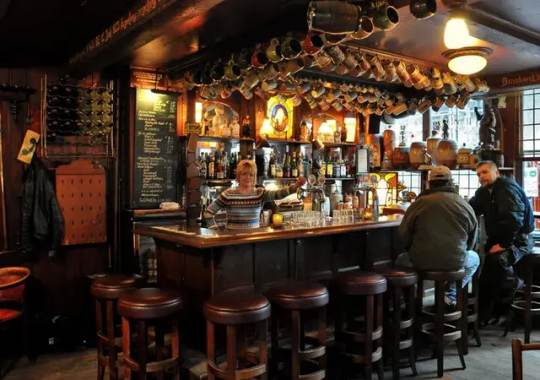
Location: Bloemstraat 42, 1015 TB Amsterdam, Netherlands Cafe Chris is the oldest establishment in Amsterdam, founded in 1624 in the Jordaan district. Due to its dark interior, it is also called “Brown Cafe”. Once upon a time, workers who were building the Westerkerk bell tower came here for wages. The cafe still has old floorboards, backlit windows, and dark wood paneling.
Gran Caffe Quadri, Venice
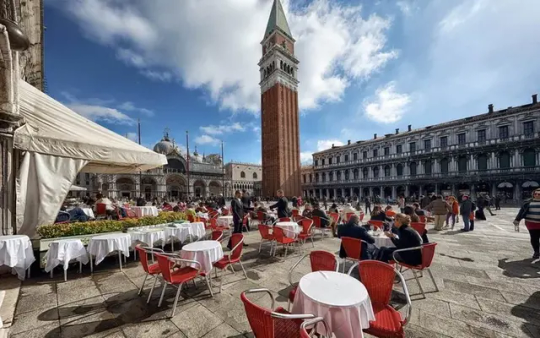
Location: Piazza San Marco, 121, 30124 Venezia VE, Italy The establishment opened its doors in 1638 - then it was called Il Rimedio. Malvasia wine was served here and was said to “invigorate the body and awaken the mind.” In 1775, merchant Giorgio Quadri and his wife Naxina, who arrived from Corfu, decided to invest in this cafe. This is how the history of Gran Caffe Quadri began. In 1830, management passed to the Vaerini brothers, who expanded the establishment by one more floor. In 2011, the Alaimo family bought the cafe. In 2018, Gran Caffe Quadri underwent a major renovation. The famous French creative and designer Philippe Starck was invited to transform it.
Cafe Procope, Paris
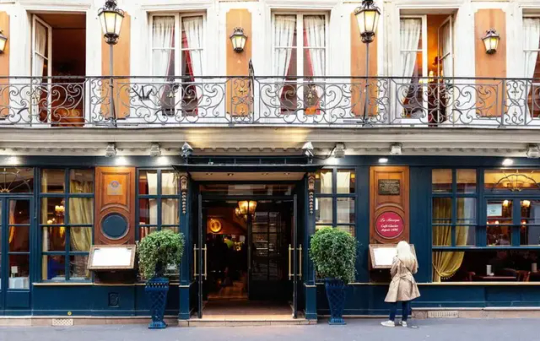
Location: 13 Rue de l'Ancienne Comédie, 75006 Paris, France Café Procope is the first literary café in Paris. It was discovered in 1686 by Sicilian immigrant Francesco Procopio dei Coltelli - after whom it took its name. Following the traditions of the Procopio family, who ran the establishment for many years, the cafe serves sorbet and granita (crushed ice), the forerunners of ice cream. King Louis XIV appointed Café Procope as the exclusive producer of sorbets. Its famous visitors include Napoleon, Honoré de Balzac, Paul Verlaine, Victor Hugo and Voltaire.
Cafe Tomaselli, Salzburg
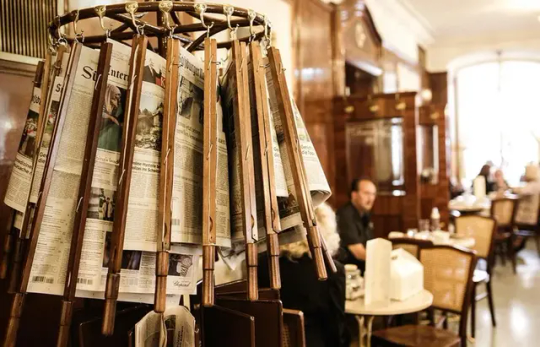
Location: Alter Markt 9, 5020 Salzburg, Austria In the center of Salzburg, on the Alter Markt square, there is the Tomaselli cafe, perhaps one of the most famous in the world. Family-owned for centuries, this restaurant embodies stylish Austrian coffee culture. The first cafe was opened here in 1703, and in 1852 it was bought by Karl Tomaselli. Mozart and his wife Constance, playwright Hugo von Hofmannsthal, and composer Carl Weber loved to visit it. Cafe Tomaselli recommends trying the Einspänner (double espresso with cold whipped cream) and Melange (an espresso-based coffee drink with the addition of heated and frothed milk and whipped cream).
Caffe Florian, Venice
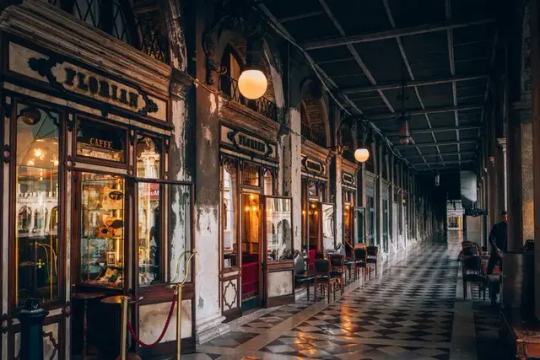
Location: Piazza San Marco, 57, 30124 Venezia VE, Italy Caffe Florian is one of the first cafes in what is now Italy. It was opened in 1720 under the name Alla Venezia Trionfante. The establishment gained popularity due to the fact that both men and women could visit it - in those years this was very rare. Over time, the cafe began to be called Florian - in honor of the owner Floriani Francesconi. In 1760, the sales point for Venice's first newspaper, Gazzetta Veneta, was opened here. At different times, the cafe was visited by Jean-Jacques Rousseau, Johann Goethe, Charles Dickens, George Byron, Giacomo Casanova, Ernest Hemingway and others. Today, Caffe Florian offers more than 30 varieties of coffee drinks, many desserts, salads and light snacks.
Antico Caffe Greco, Rome
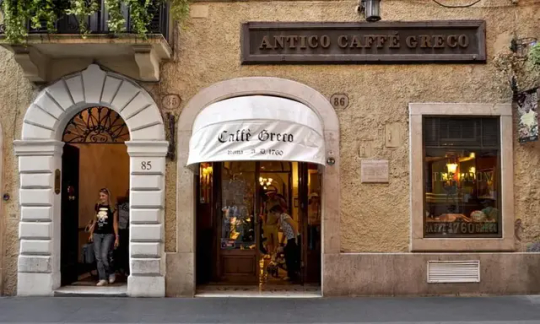
Location: Via dei Condotti, 86, 00187 Roma RM, Italy Antico Caffè Greco is a historical café in Rome, opened in 1760. Its founder is the Greek Nicola della Maddalena. Over the centuries, the elegant Caffè Greco has been visited by Hans Christian Andersen, George Byron, Henrik Ibsen, John Keats, Mark Twain and others. Some 300 paintings, memorabilia and vintage photographs of famous clients adorn the walls of this establishment. And gilded mirrors and a piano help maintain an authentic atmosphere.
Caffè Al Bicerin, Turin
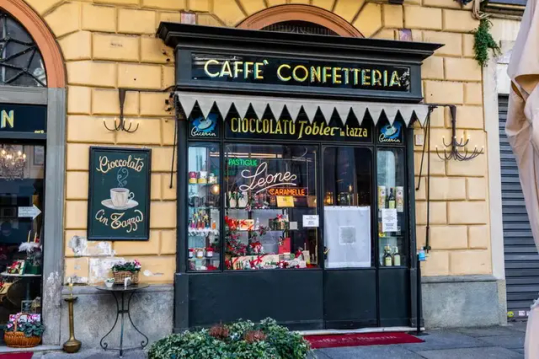
Location: Piazza della Consolata, 5, 10122 Torino TO, Italy The history of the establishment began in 1763, when Giuseppe Dentis opened his small shop in the premises opposite the entrance to the Santuario della Consolata Cathedral. In 1856, the current building was built here according to the design of the architect Carlo Promis. And then the cafe acquired a more elegant form, which we can appreciate today - its walls were decorated with wooden panels, mirrors and lamps. It now has round white marble tables, a counter, and shelves. This establishment was the birthplace of the famous Turin drink Bicerin - a mixture of coffee, chocolate, milk and syrup. Even Alexandre Dumas mentioned it in one of his novels.
El Fishawy, Cairo
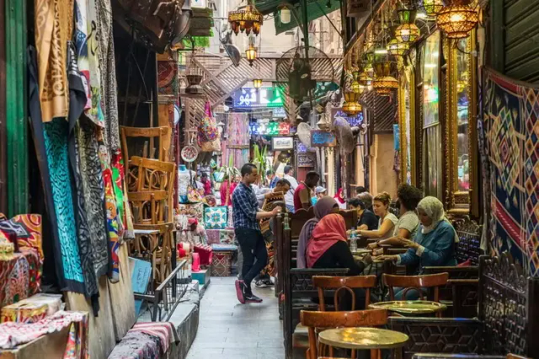
Location: El-Gamaleya, El Gamaliya, Cairo Governorate, Egypt El Fishawy Café is hidden in the heart of Khan Al Khalili Souk. Its doors opened to visitors in 1773. The first owner of the establishment served Turkish coffee to his friends after sunset. There were more and more people wanting to enjoy a cup of aromatic drink and discuss city news. And then the owner bought buildings nearby, added even more items and hookah to the menu. The current owners of El Fishawy, heirs of the founder, are trying to preserve the traditions and atmosphere of the establishment.
Cafe Tortoni, Buenos Aires, 1858

Location: Av. de Mayo 825, C1084 Buenos Aires, Argentina Cafe Tortoni is considered the oldest in Argentina. It was opened by an emigrant from France in 1858 and named after the café of the same name in Paris. It is worth noting that the first premises of Cafe Tortoni were located on Avenida Rivadavia. The cafe moved to its current location in 1880. The owners have maintained the same style of the establishment throughout all the years of its existence. There is a tango room, as well as tables for playing billiards, dominoes and dice. His most famous guests were Garcia Lorca, Jorge Luis Borges, Carlos Gardel, Hillary Clinton, Albert Einstein, Robert Duvall.
Café Gerbeaud, Budapest
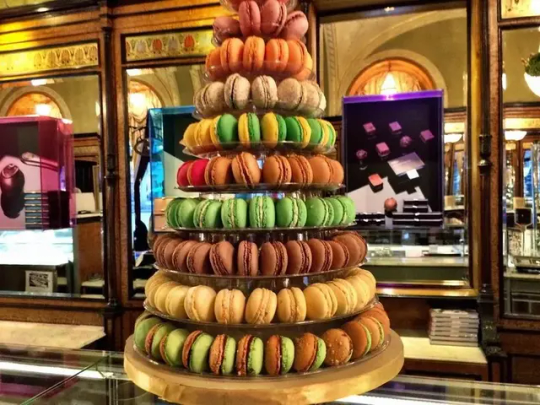
Location: Budapest, Vörösmarty tér 7-8, 1051 Hungary Café Gerbeaud is the most famous cafe in Europe, whose history began in 1858. Its founder is Henrik Kugler, a representative of the third generation of a dynasty of confectioners. He became the first to offer customers slices of his signature Coogler cake to-go in cardboard boxes. During a visit to Paris in 1882, Henrik Kugler met Emil Gerbaud - they soon became business partners. And later, a French confectioner entrepreneur bought the cafe completely. With the advent of Gerbeau, many changes took place in the confectionery - the menu expanded, the equipment changed, and the staff increased. Café Gerbeaud became a favorite place not only among city residents, but also among city guests, since the prices here were affordable for absolutely everyone. After Emile Gerbeau's death in 1919, his wife ran the confectionery. From 1950 to 1984 the cafe was nationalized and was called Vörösmarty. In 1995, Café Gerbeaud was bought by German entrepreneur Erwin Franz Müller. The establishment was renovated and restored to its historical appearance.
Gran Caffè Gambrinus, Naples, Italy
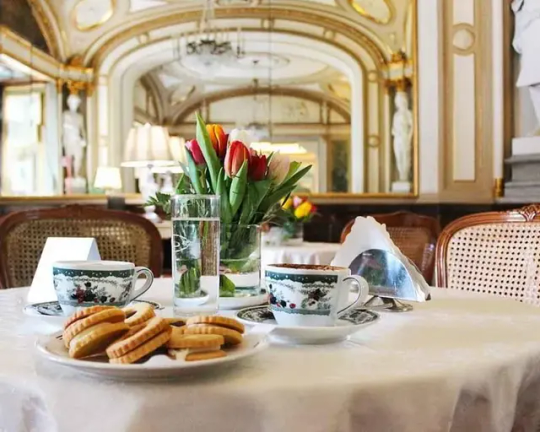
Location: Via Chiaia, 1/2, 80132 Napoli NA, Italy The legendary coffee shop is located in the center of Naples. The establishment was founded by Vincenzo Apuzzo in 1860 - his dream was to create the best cafe in Italy. The next owner was Mario Vacca in 1889. By that time, the premises were already in need of reconstruction. The owner of the cafe invited an architect and artists who worked on updating the interior. Their paintings and sculptures adorn Caffè Gambrinus to this day. The establishment was once visited by Matilda Serao, Ernest Hemingway, Oscar Wilde, Guy de Maupassant, Princess Sissi, and Emile Zola. By the way, the tradition of caffé sospeso was born here - paying for coffee for the next customer.
Cafe de la Paix, Paris
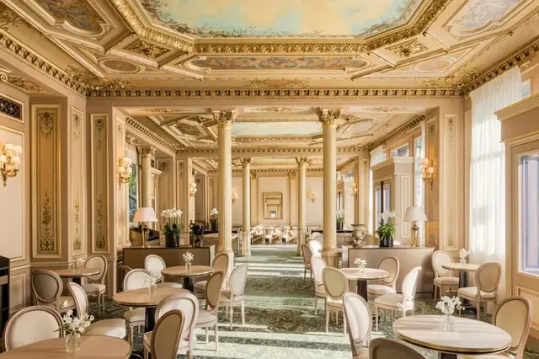
Where is it: 5 Pl. de l'Opéra, 75009 Paris, France Café de la Paix is located in the 9th arrondissement of Paris, at the intersection of Boulevard des Capucines and Place de l'Opéra, in the building of the Le Grand Hotel. The hotel and cafe were opened in 1862 with the financial support of the Pereire brothers. The Café de la Paix gained its first international reputation in 1867, serving the International Exhibition. The establishment, located next to the Opera Garnier, attracted many famous personalities. Pyotr Tchaikovsky, Jules Massenet, the Prince of Wales and Edward VII visited here. In 1896, Eugene Piroux held film screenings at the Café de la Paix, and later a radio studio was organized there. Just like 150 years ago, today the restaurant is also very popular. Salads, hot dishes, snacks and desserts are served here.
Café du Monde, New Orleans
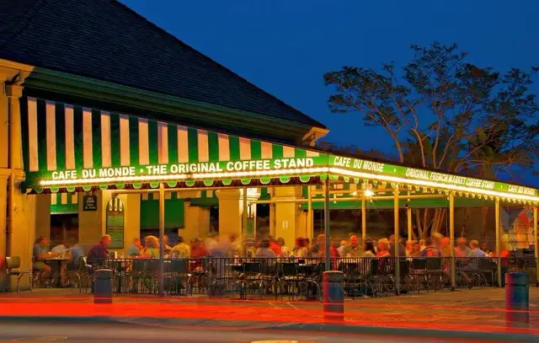
Location: 800 Decatur St, New Orleans, LA 70116, USA Café du Monde is a true New Orleans landmark. The establishment has been in business since 1862 and always serves dark roasted chicory coffee, milk (regular or chocolate), fresh orange juice, hot chocolate and French donuts (beignets).
Cafe Landtmann, Vienna
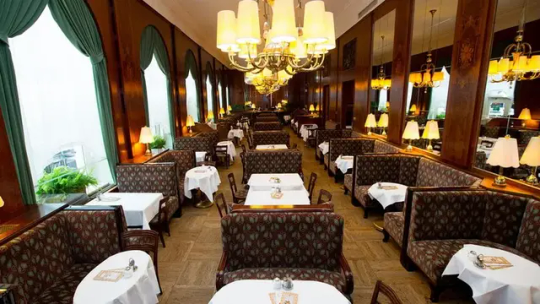
Location: Universitätsring 4, 1010 Wien, Austria Café Landtmann is the oldest in Vienna. Guests began to be received here on October 1, 1873. Franz Landtmann dreamed of opening not just a coffee shop, but the most elegant place in Vienna. And he did everything for this - visitors were delighted with the innovative spirit of the establishment. Years passed, the owners changed, but this place was always popular among citizens and guests of the capital. In the 1970s, Cafe Landtmann was threatened with closure, but thanks to the efforts of the new owners, it was saved.
Baratti & Milano, Turin
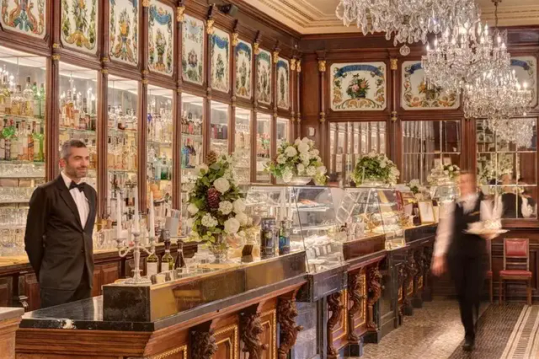
Location: Piazza Castello, 27, 10123 Torino TO, Italy Caffè Baratti & Milano is a historic café in Turin, opened in 1875 in the central Galleria Subalpina. The establishment owes its name to two pastry chefs from Canavese: Ferdinando Baratti and Edoardo Milano. Soon after its opening, Caffè Baratti & Milano became a meeting place for the intelligentsia and the bourgeoisie. Its success has grown to the level of "official supplier of the Royal House". The current appearance of the restaurant is the result of reconstruction in 1909. The room has a lot of marble, bronze, stucco, gilding and wide mirrors, which give this place a rich artistic appearance. The cafe was damaged during the Second World War, but was restored in 1948. Caffè Baratti & Milano offers its visitors more than 20 types of coffee drinks, tea, light snacks, pastries and sweets.
Cafe Central, Vienna
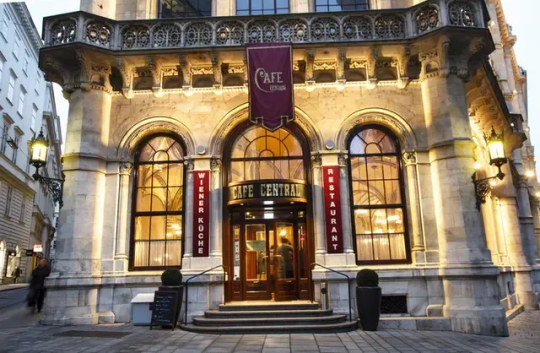
Location: Herrengasse 14, 1010 Wien, Austria The Central coffee shop is the most popular place in Vienna and is included in all must-see lists in this city. There are always long queues here - people come here to drink delicious coffee, eat strudel, listen to live music and just enjoy the atmosphere. Cafe Central was founded by the Pakhi brothers in 1876. Over time, the establishment became a popular place where cultural representatives loved to come. His regular guests were Egon Friedel, Peter Altenberg, Adolf Loos, Alfred Adler, Leon Trotsky and others. After World War II, Cafe Central closed. In 1975, the Ferstel Palace, where the establishment was located, was completely renovated. After this, the cafe reopened its doors to visitors.
Cafe Sacher Wien, Vienna
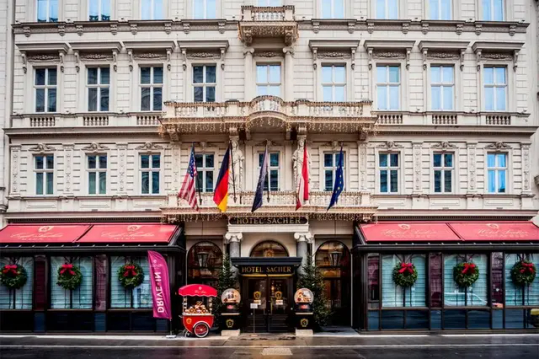
Location: Philharmoniker Str. 4, 1010 Wien, Austria Another must-visit place in Vienna is the famous Sacher Wien café. After all, this is where they serve Sachertorte, made according to the classic recipe. In 1876, the Sacher family opened a hotel next to the Vienna Opera, which operated a café. It became a place where it was customary to have dinner before attending the opera - writers, artists and high-ranking officials met here. Today, Cafe Sacher Wien is still very popular, as evidenced by the long queues.
Les Deux Magots, Paris
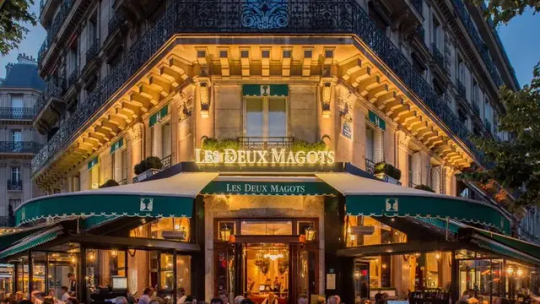
Where is it: 6 Pl. Saint-Germain des Pres, 75006 Paris, France Les Deux Magots is a famous Parisian cafe located in the luxurious Saint-Germain-des-Prés quarter. It opened its doors to visitors in 1884. Originally a novelty store was located here, later coffee liqueurs were sold on this site. By 1914, the company was on the verge of bankruptcy, and was bought by Auguste Boulet for his cafe. His heirs still manage the establishment to this day. Since then, Les Deux Magots has played an important role in the cultural life of the capital - writers, poets, artists and other intellectuals gathered here. Among the guests in the cafe one could meet Pablo Picasso, Bertolt Brecht, Albert Camus. The establishment has been described more than once in literary works and shown in films.
Cafe de Flore, Paris

Location: 172 Bd Saint-Germain, 75006 Paris, France Cafe de Flore was opened in 1887 in the 6th arrondissement of Paris, on the corner of Boulevard Saint-Germain and Rue Saint-Benoît. The interior of the establishment, in the classic Art Deco style, has remained virtually unchanged since World War II. Since its opening, intellectual audiences have met here. Among the famous guests at Cafe de Flore were Robert Desnos, Pablo Picasso, Georges Bataille. By the way, Charles Maurras wrote his book Au signe de Flore while sitting on the first floor of the cafe. The restaurant's menu includes breakfasts, salads, cheeses, hot dishes, drinks and desserts.
Cafe Comercial, Madrid

Location: Glorieta de Bilbao, 7, 28004 Madrid, Spain Café Comercial is located in the Glorieta de Bilbao square. It was founded by Antonio Gomez Fernandez in 1887. Read the full article
3 notes
·
View notes